African Centre For Biodiversity

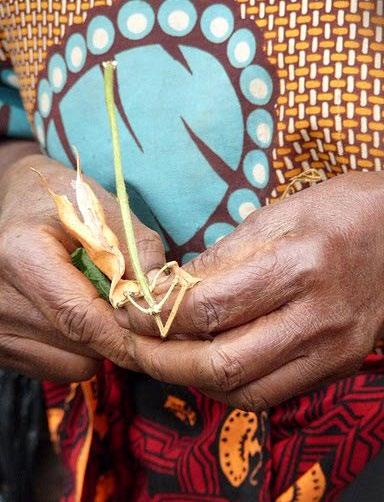





Celebrating our legacy of two decades

years of advocating for food sovereignty in Africa
The African Centre for Biodiversity (ACB) is a research and advocacy organisation working towards food sovereignty and agroecology in Africa, with a focus on biosafety, seed systems and agricultural biodiversity. The organisation is committed to dismantling inequalities and resisting corporate industrial expansion in Africa’s food and agriculture systems.
© The African Centre for Biodiversity www.acbio.org.za
PO Box 29170, Melville 2109, Johannesburg, South Africa.

This publication is licensed under a Creative Commons AttributionNonCommercial-NoDerivatives
4.0 International License. This publication may be shared without modification for non-commercial use provided the African Centre for Biodiversity is acknowledged as the source. Prior written agreement is necessary for any commercial use of material or data derived from this publication.
Design and layout: Adam Rumball, Sharkbuoys Designs
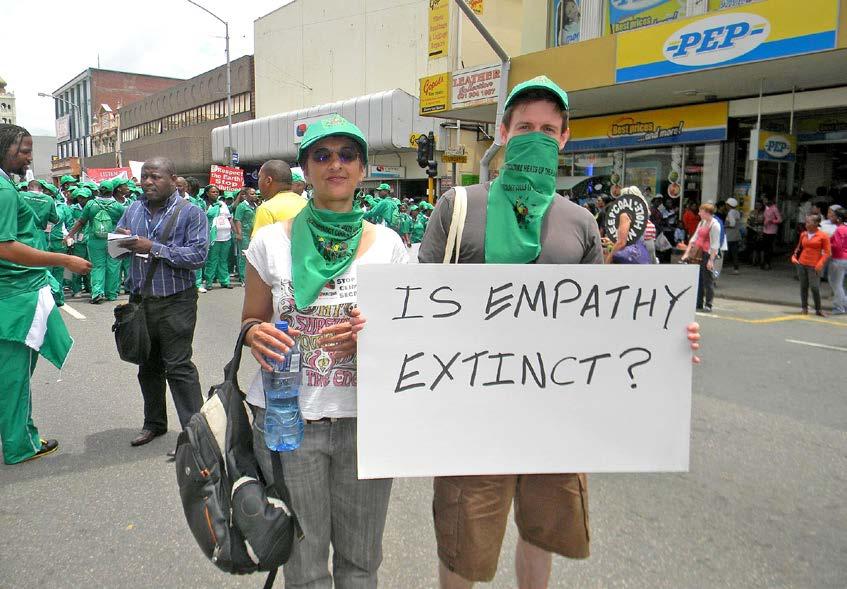
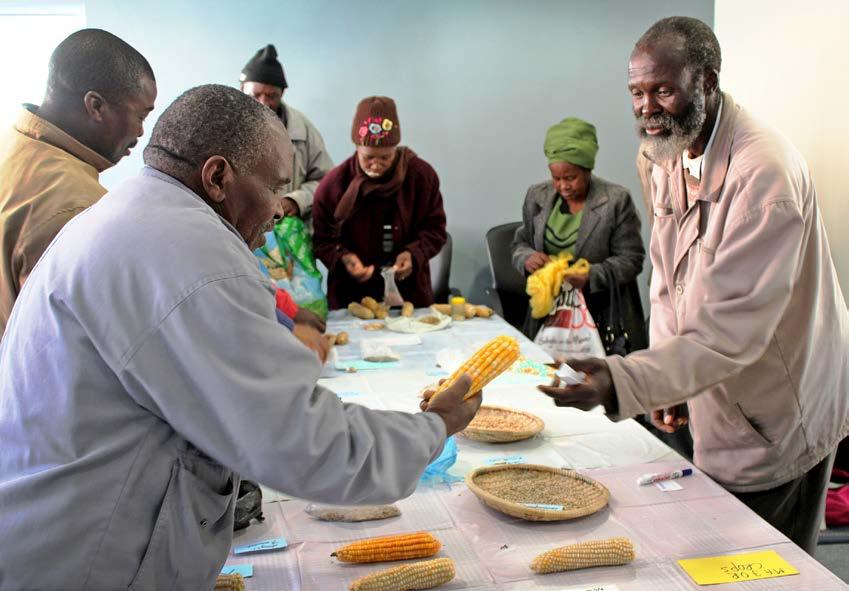
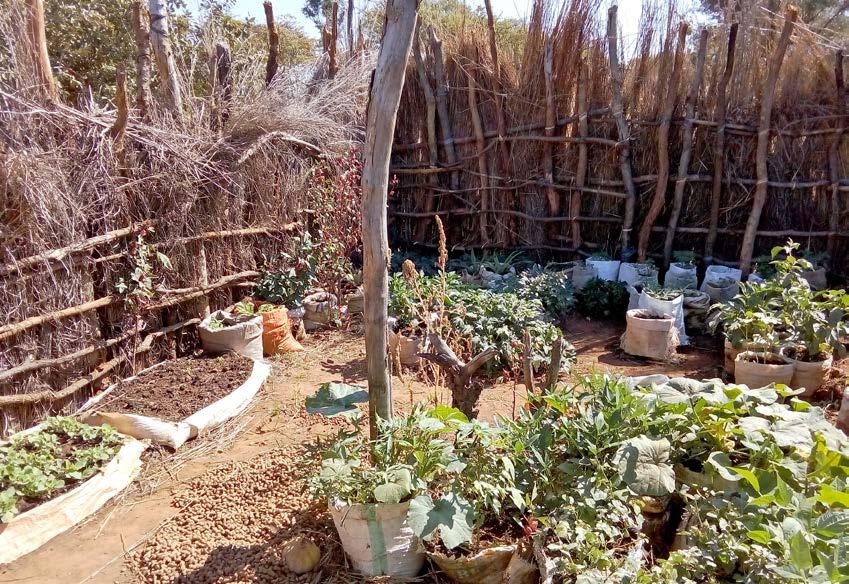
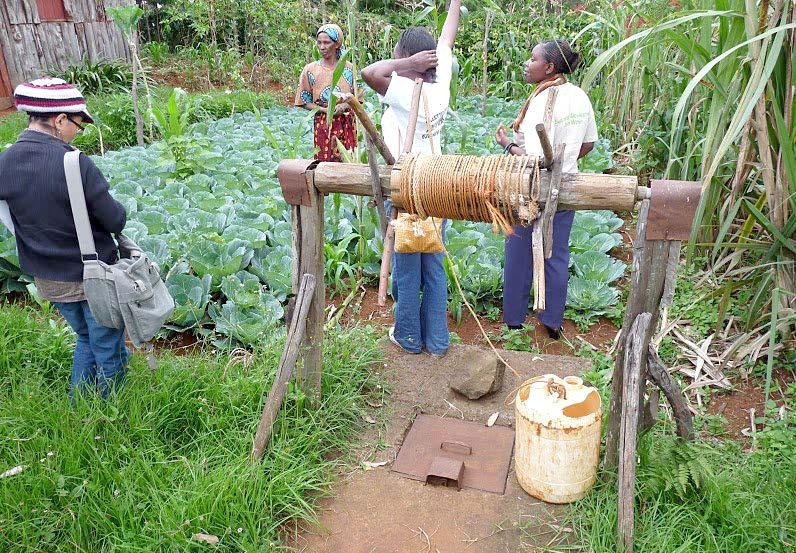

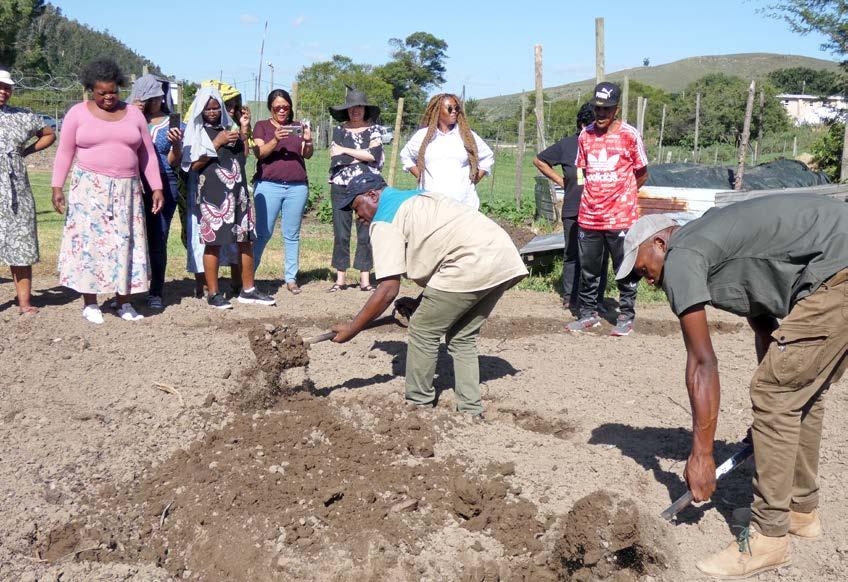

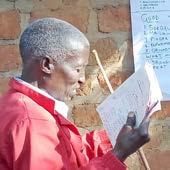
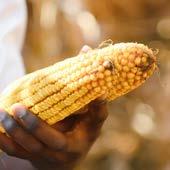

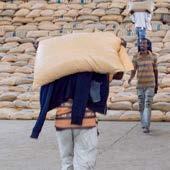
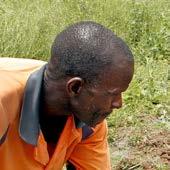
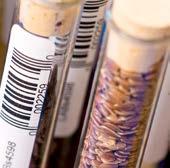
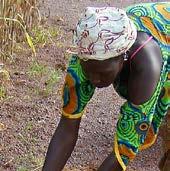
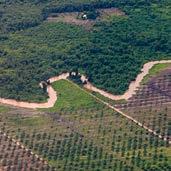
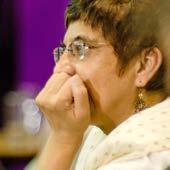
2023 marked the twentieth anniversary of the African Centre for Biodiversity (ACB), which traces its humble beginnings when the organisation was first named the African Centre for Biosafety, to reflect the principle focus in the early years on genetic modification (GM) and biosafety, in food and agriculture. Over time, this evolved into working on interconnected issues affecting food sovereignty and biodiversity in Africa, including industrial agriculture, seed and plant variety protection policies laws, farmer managed seed systems (FMSS), farmers’ rights (FR), agricultural biodiversity, agroecology and corporate expansion and control in agriculture and food systems. Our current geographical focus remains mostly on Southern and East Africa, with extensive West African, continental and global networks. Internal reflections on this rich history of two decades led us to revise and update our vision and mission statements, to align with the evolution of our work.
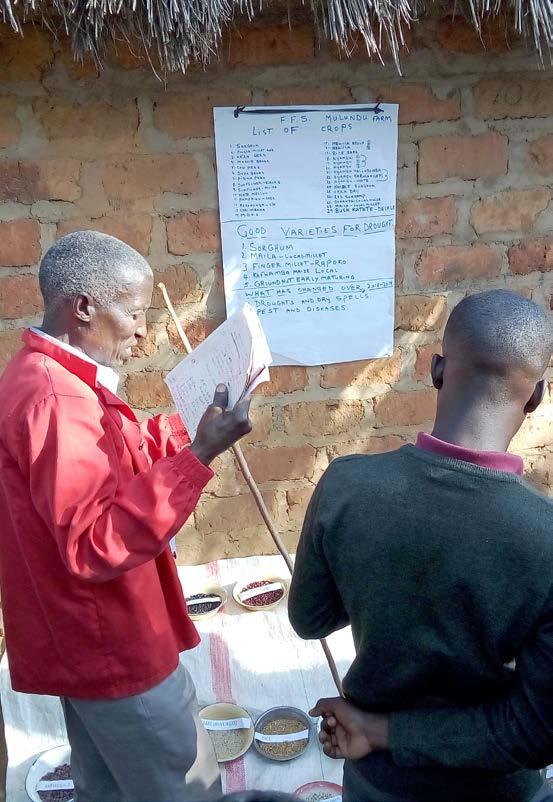
We envision culturally and biologically diverse landscapes, territories and food systems in Africa that are socially just and democratic, based on the interconnectedness and harmonious co-existence and co-creation between people and nature.
Our mission is to carve transformative pathways through cogenerating and diffusing new discourses and catalysing action at the intersections of biodiversity, climate change and food systems to shift power and social changes that advance a just transition in Africa. Our work is anchored in a value system of reciprocal, horizontal and interconnected relationships between people and nature.
The ACB’s theory of change has remained consistent during the current reporting period.1
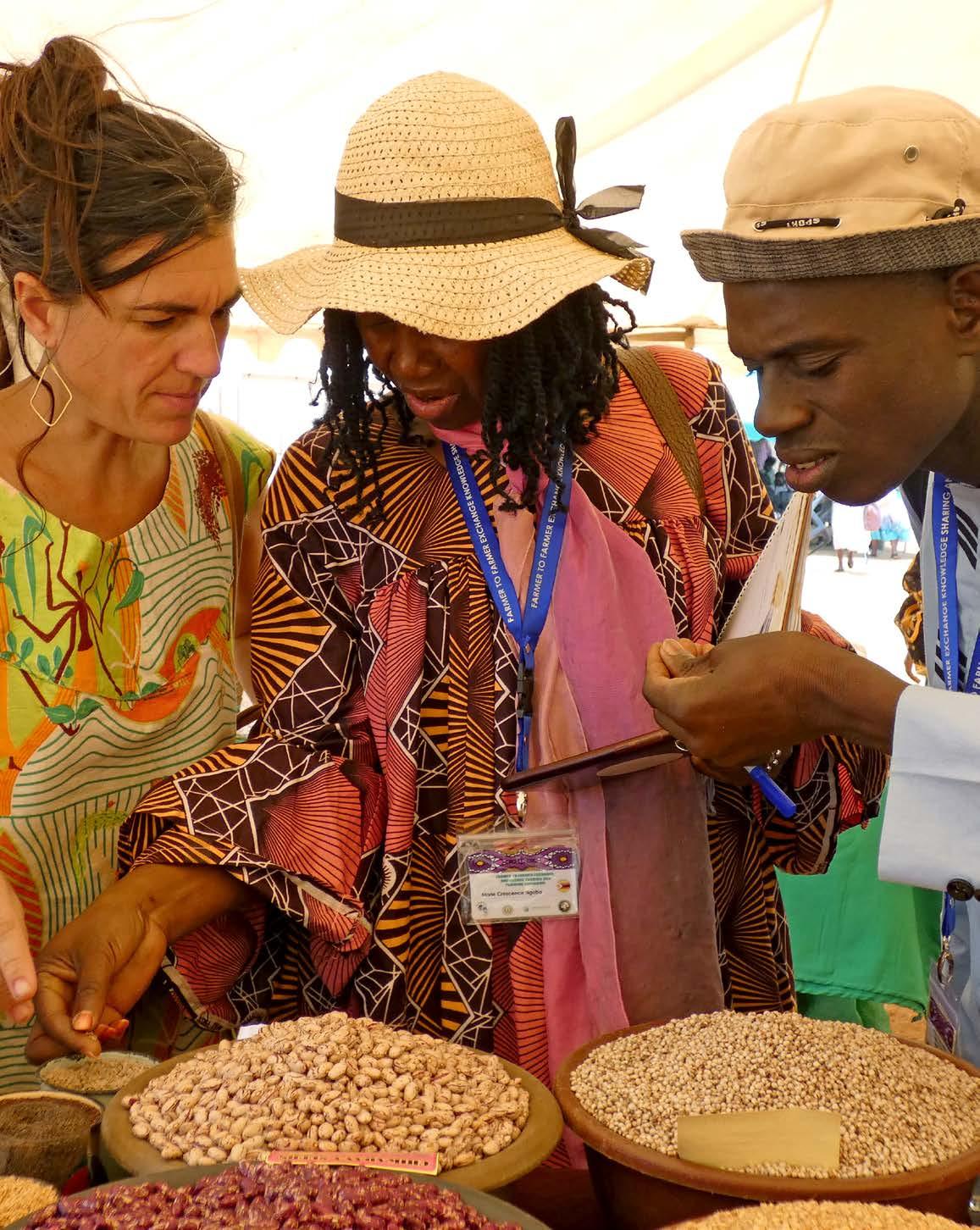
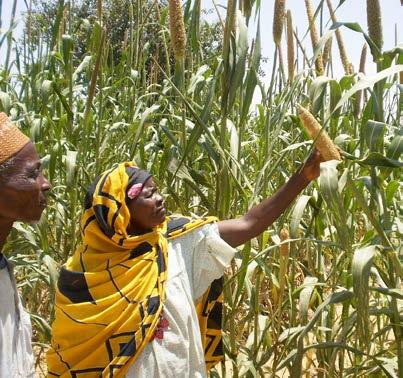
We would like to express deep gratitude to our generous funding partners – many of whom have supported our work for several years and become close allies and friends. The work that came to fruition, as reflected in this report and in the twodecade legacy we are celebrating, has been possible through your benefaction.
Thank you to Bread for the World, Development Cooperation Agency of the Austrian Catholic Children’s Movement (DKA), New Venture Fund/11th Hour Project, Porticus, Schmidt Family Foundation, Swedbio/Stockholm Resilience Fund, Swift Foundation, Swiss Agency for Development and Cooperation (SDC) and Thousand Currents.
With most of our work being collaborative, we would also like to also express our gratitude to our dedicated staff and the individuals and organisations that we have partnered with this year, and over the last 20 years. A list of our stakeholders and partners is included further in the report.
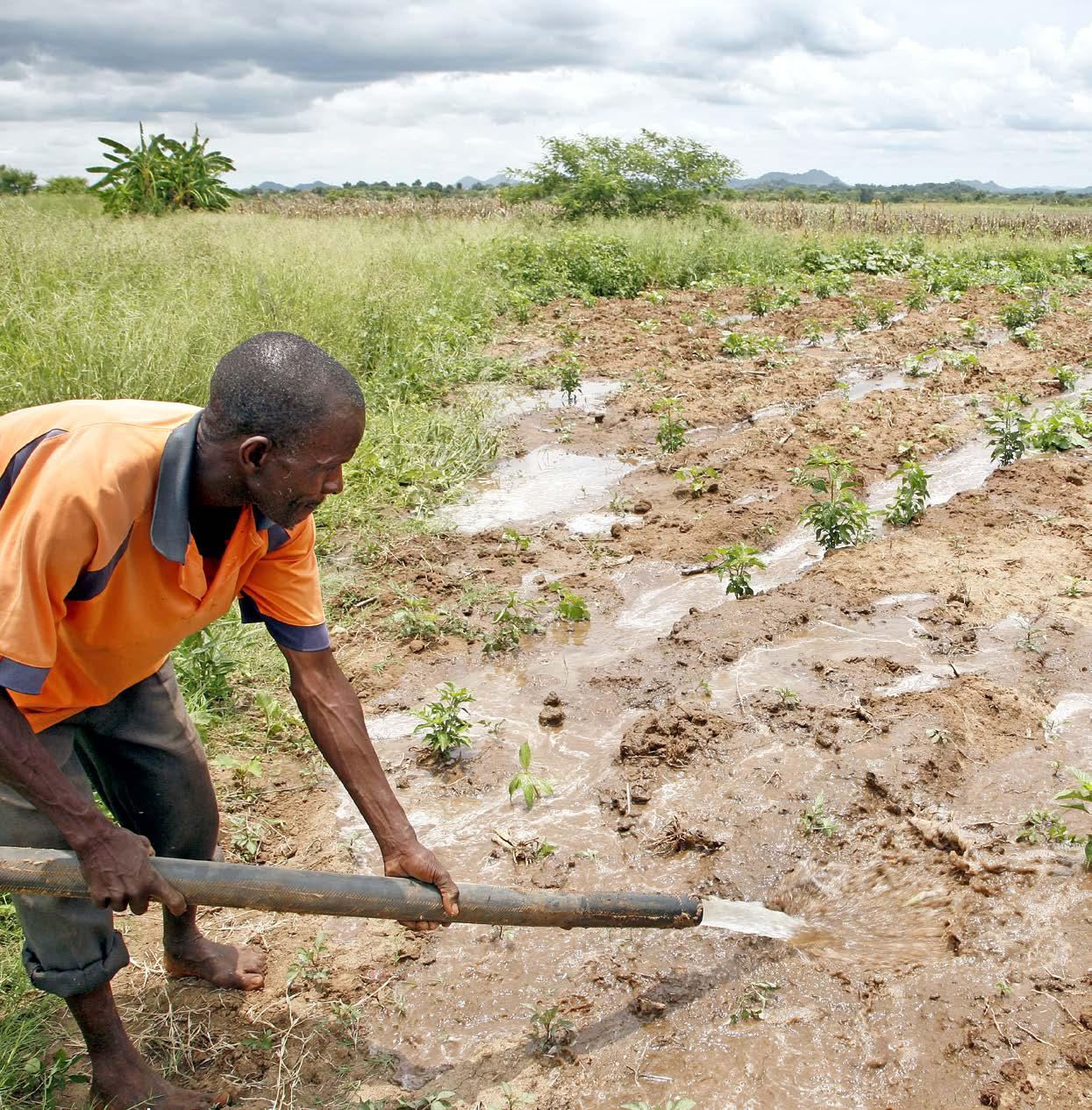
We intensified our work both in active resistance to industrial agriculture encroachment and critical analysis and deconstruction of corporate and false narratives ” “
Our renewed statements of intent arose out of witnessing and reflecting upon the multiple metastasising crises unfolding on the global stage, and the extent to which people and the environments of Africa bear the brunt of their negative impacts, despite being least responsible for causing them. A great deal of attention was directed at the alarming rate of biodiversity loss, climate change, food insecurity, social disintegration, authoritarianism, precarity and injustices. Within this context, the ACB produced new work focused on the multidirectional and complex interactions between food systems, biodiversity – particularly agricultural biodiversity – and climate change, and the need to address these in an integrated way. This change continues to capture the essential nature of the ACB and the dynamic nature of our work. Hence, we remain an activist research and advocacy organisation working towards food sovereignty and agroecology in Africa, with a focus on biosafety, seed systems, agricultural biodiversity, agroecology, and the intersections between biodiversity, climate change, and food systems. We remain steadfast in our commitment to contributing significantly to building awareness and catalysing change through our own agency, and supporting civil society mobilisation in response to priority issues. The geographical focus of our work also remains unchanged and, thus, is focused mostly on Southern
and East Africa, with extensive West Africa and continental and global networks.
The ACB navigated through the multiple challenges in the current architecture by tackling strategic work and interventions. This is despite financial capital and transnational corporations having immense power in shaping international, regional and national policy agendas. We intensified our work both in active resistance to industrial agriculture encroachment and critical analysis and deconstruction of corporate and false narratives. We also strongly embraced the proposal of solutions; for example, the need for a rapid shift in energy sources and agroecological transitions in food systems, based on proven and effective technologies and practices. We especially undertook catalysing and co ordinating work in South Africa (SA) regarding agroecology, by way of national coalition building dialogue, and the articulation of common civil society and political goals regarding a just transition in food and agriculture. Nevertheless, we continue to experience obstacles in realising transitions that are social and political – not technological – in nature. Financial-corporate power is on the other side, characterised by disinformation, denialism and “business as usual”, with economic elites constantly seeking ways to capture crisis responses to increase wealth extraction and profit.
Amidst a dangerous decline in nature threatening the survival of one million species and impacting the lives of billions of people, the GBF aims to halt and reverse nature loss
We were deeply involved in international negotiations that led to the adoption of the Global Biodiversity Framework (GBF) in December, under the auspices of the United Nations Convention on Biological Diversity (CBD). Amidst a dangerous decline in nature threatening the survival of one million species and impacting the lives of billions of people, the GBF aims to halt and reverse nature loss. The framework consists of global targets to be achieved by 2030 and beyond to safeguard and sustainably use biodiversity.
We maintained a good balance between our seed law and policy work at national, regional, and international levels, supporting partners in the region and generating rich communications content, including progress on making a film about seed and providing opportunities for practical learning and exchanges between smallscale farmers, vis-à-vis their seed systems.
Some of the strategic interventions and bodies of work undertaken include the following:
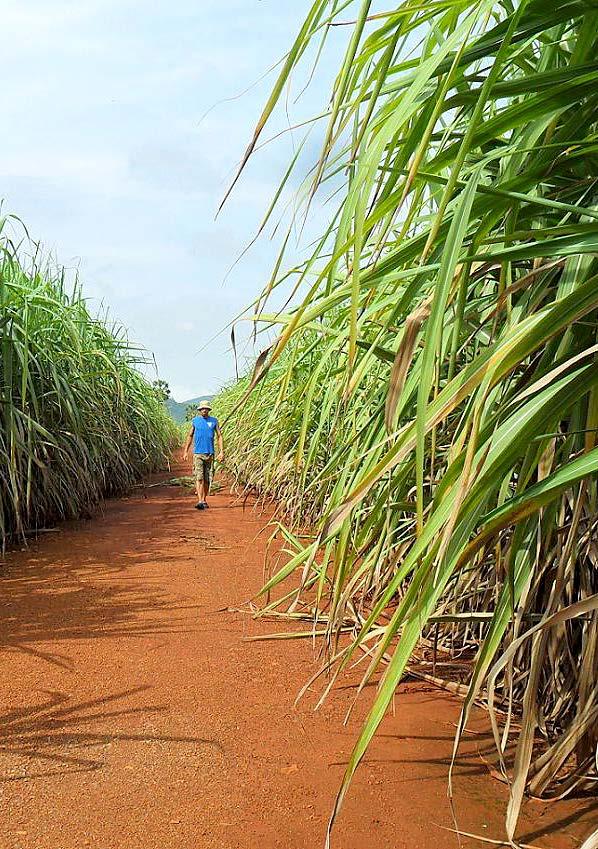
• Continuation of the litigation against Bayer/Monsanto about the introduction of GM drought-tolerant maize.
• Opposition to the import into SA and Nigeria of GM wheat from Argentina in the context of the geopolitics emanating from the war between Russia and Ukraine.
• Research and advocacy work on the intersections of biodiversity, agricultural biodiversity, FR, FMSS, food systems, agroecology and climate change
• Production of new work on the status of digital agriculture in Africa and the impact of financialisation and dematerialisation.
• Discreet work on seed law and policies in Malawi, Kenya, Tanzania, and SA.
• Support for a People’s Tribunal on Pesticides linked to the global campaigns to phase out highly hazardous pesticides (HPPs), which in turn is linked to new work on 2,4-D as an HHP and GM maize tolerant to 2,4-D approvals in SA.
• Participation in the negotiations under the International Treaty on Plant Genetic Resources for Food and Agriculture (ITPGRFA) and the CBD, where we continue to champion the recognition and safeguarding of farmers’ rights (FR).
• Co-hosted a regional meeting focusing on seed laws and policies that included both civil society organisations (CSOs) and government officials, including a discussion on addressing the need, politically and practically, to recognise farmer-managed seed systems (FMSS) and FR
• Hosting a South-South Dialogue in Zanzibar, with thought leaders from Africa, Asia, and Latin America to discuss and exchange ideas, information and analysis on the intersection of biodiversity, climate change, and agriculture and food systems.
• Launch of a pioneering series on ultra-processed food in Africa traversing discreet topics
• Pioneering political and social movement work in SA regarding catalysing the agroecology movement, and related policy work with a strong emphasis on climate change adaptation. The ACB is strategically using the 13 agroecological principles put forward by the Committee on World Food Security’s HighLevel Panel of Experts on Food and Nutrition (HLPE) as a framing mechanism for its political work. This strategy offers an integrative approach to key sustainability issues of biodiversity, land and natural resource governance, participation, and ecological practices.
• Co-hosting a national policy dialogue on just transitions and adaptation in the SA food system, with the release of a series of six fact sheets in five languages and the release of a report.

The ACB’s biosafety work is well developed, anchored in our two decades of research, analysis, capacity building, engaging in international, regional, and national policy processes, strategic planning, skilled staff, and relationship building. From the various external reviews conducted, partners have noted that the ACB’s body of work could ably stand in as institutional memory on issues of biosafety and corporate expansion. Partners also appreciate the way the ACB picks up emerging issues and technologies and delves into the technicalities of these, making expertise available, and analysing and digesting with partners, to create new knowledge, discourses and political positions that are anchored within food sovereignty and agroecological frameworks. In this regard, the ACB is flexible in terms of participating directly and indirectly in response to demands for technical support and to build on its regional experience. This approach has created a track record in opposing GMOs using credible arguments on the African continent, which has placed it in a pivotal position to influence change. During 2023, we continued to monitor and respond to the GM expansion in Africa, with an emphasis on SA’s role in facilitating the uptake of genetically modified organisms (GMOs) on the rest of the continent. In SA, we continue to be vigilant, monitor, track and oppose new/ strategically important GMOs with dedicated work being done regarding 2,4-D GM maize varieties.

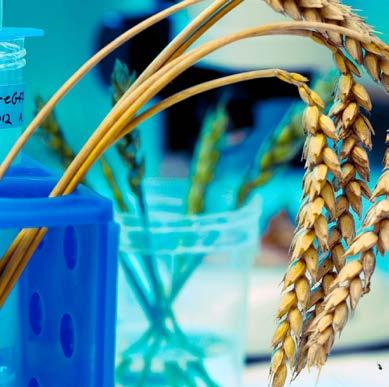
Following on from ACB’s attendance of the CBD’s fifteenth Conference of Parties (COP 15), held in Montreal, Canada, in December 2022, executive director Mariam Mayet and research and advocacy officer Sabrina Masinjila reflected on the proceedings in a blog titled, Global Biodiversity Framework and synthetic biology: missed opportunity for biosafety and biodiversity protection forAfrica 2 A contested issue in protracted negotiations for the setting of the Post-2020 GBF has been whether living modified organisms (LMOs) derived from emerging GM technologies such as synthetic biology fall within the scope of the CBD’s Cartagena Protocol on Biosafety. The ACB supports the position that new GM techniques must be regulated. We have argued that the GBF has failed Africa regarding its inability to address synthetic biology headon, as reflected in, for example, biosafety Target 17 being whittled down to a mere reference to strengthening capacity building.
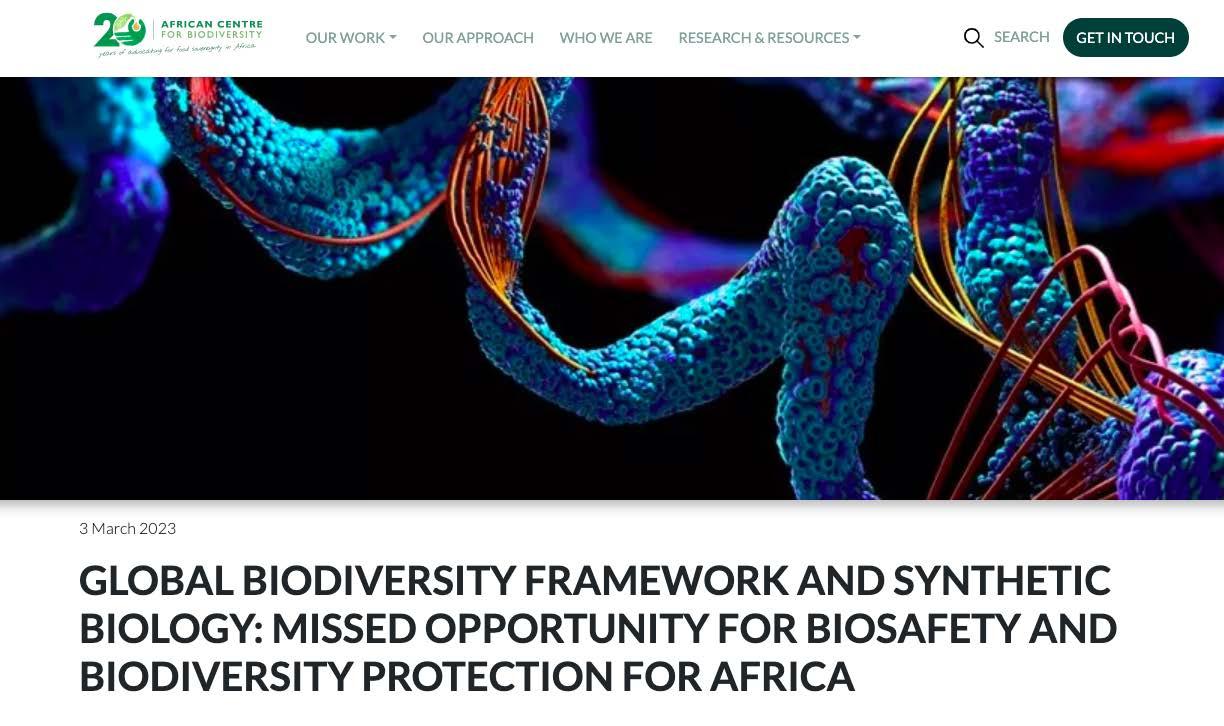
Meanwhile, on a positive note, the South African government’s stance is that its biosafety law applies to all GMOs – a decision that was taken on administrative appeal by the biotechnology, seed and agrochemical industries. In 2023, the Minister of Agriculture constituted an appeal board that overruled the government’s position. However, the final decision taken by the Minister in August 2023 was to overrule the appeal board’s decision

and confirm that new breeding technologies and its living modified products were to be regulated by the GMO Act. This was and continues to be a big blow for the biotech industry who now must adhere to biosafety procedures as opposed to a free pass. The SA decision has presented opportunities for the ACB to work with its partners in Malawi, Nigeria, Kenya, and Ghana to reverse the permissive approaches taken in those countries.
In the lead-up to COP 15 at the end of 2022, the ACB wrote a series of five papers, The Africawewant?Aneo-imperialistfoodregimereinforcedbyAgenda2063,theUnited NationsFrameworkConventiononClimateChange(UNFCCC),andtheCBD . 3 Many of our network partners and those engaged in and following the discussions found this series an invaluable resource in terms of identifying and ventilating the key issues.
T he South African government’s stance is that its biosafety law applies to all GMOs - a decision that was taken on administrative appeal by the biotechnology, seed and agrochemical industries
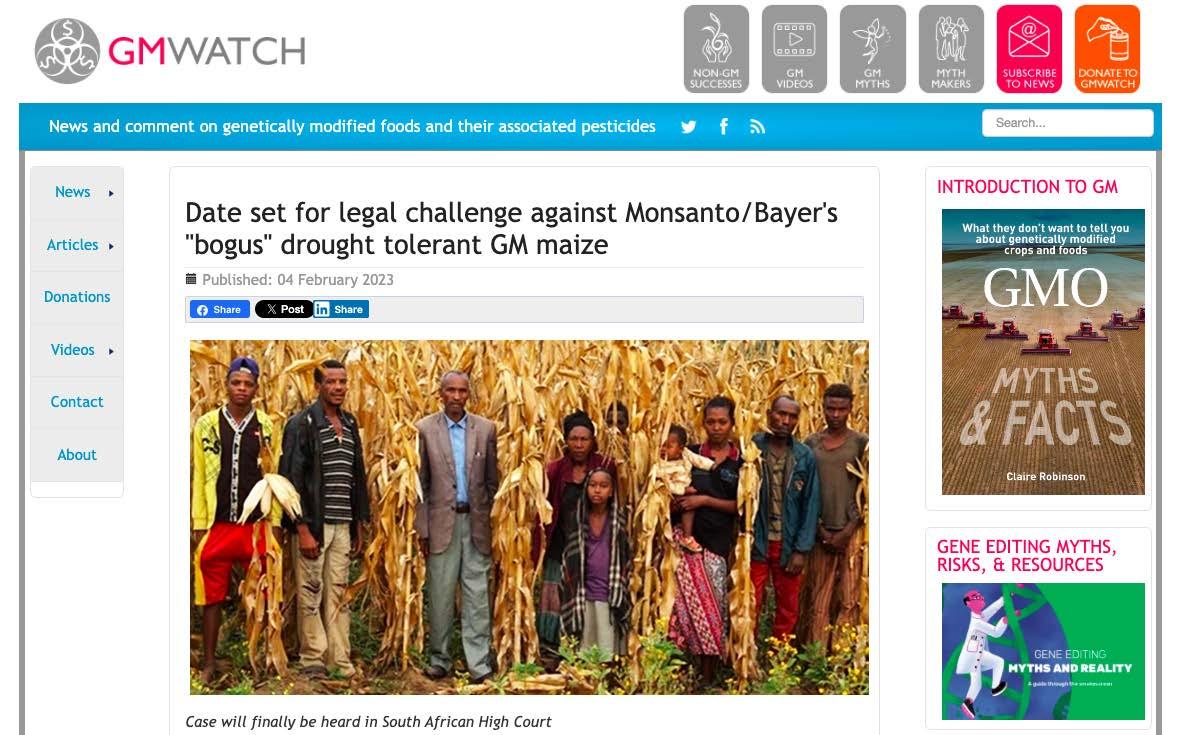
In 2017, the ACB lodged legal proceedings with the High Court of SA to review and overturn the decisions of the South African Executive Council: GMO Act (EC), the GMO Appeal Board, and the Minister of Agriculture approving Monsanto/Bayer’s GM DT maize variety for commercial cultivation. Following five years of extended legal proceedings, the case was heard in February in the High Court. However, in her judgment4 of 27 June, Justice Tolmay refused to grant the ACB’s request to review the decision.5 In response, we applied for leave to appeal against the judgment, which was granted and so the ACB has begun preparations for an appeal to the Supreme Court of Appeals.

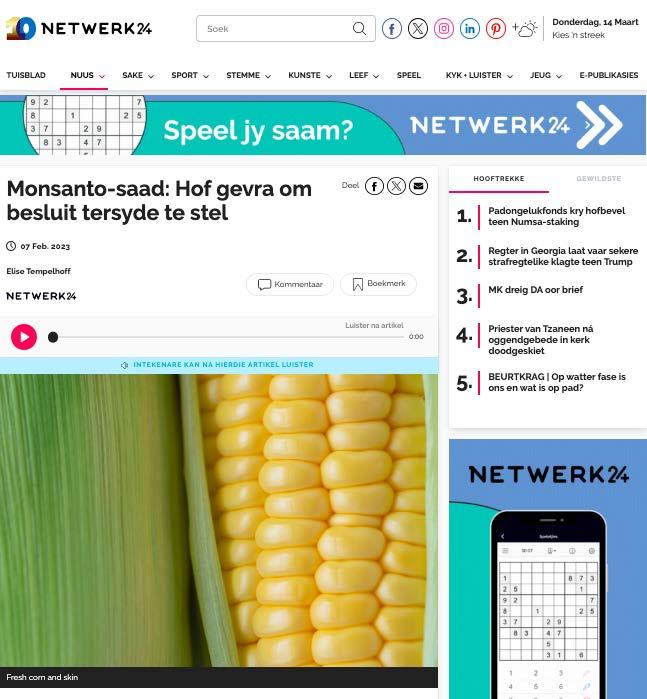
The litigation, spanning more than eight years, has precluded Monsanto from commercially selling these GM maize seeds as climate change solutions to commercial farmers in SA and the rest of the Southern African region as it had intended. The ACB has consistently argued that there is insufficient data to demonstrate the claimed drought tolerant benefit, based on either yield or agronomic performance advantage.6
In May, the ACB released: Unsafe GM wheat to enter SouthAfrica’s food systems: Disaster capitalism, biotech industry in decline & instrumentalisation of wheat in Africa,7 in English, Spanish, and Portuguese, endorsed by 85 organisations. Further, we submitted8 to the SA biosafety authorities arguments in favour of reviewing and reassessing their August 2022 approval of the importation into SA of GM wheat as food, feed, and industrial food and feed processing, following Nigeria’s approval.
Following this, the ACB catalysed the formation of a South-South coalition of activists from Latin America, Asia, and Africa – from countries that have approved the commercial cultivation of GM wheat (Argentina, Brazil and Paraguay) and countries that have approved the importation of GM wheat (Colombia, Indonesia, SA and Nigeria). This group is working on multiple advocacy and communications strategies to stop GM wheat proliferation in the world’s food and agriculture systems.


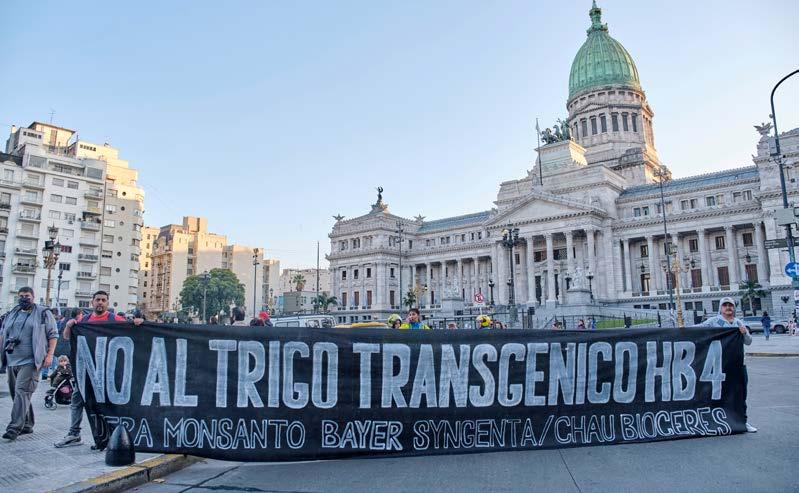
In March, the ACB published a report9 arguing that 2,4-D should be classified as an HHP in SA, based on previous work that included opposition to three GM maize varieties engineered by Corteva to tolerate 2,4-D. With assistance from environmental lawyer Angela Andrews, we then sent a further substantive submission to government in December,10 requesting they review their decision to allow the marketing and use of 2,4-D.
The ACB continued monitoring, supporting and engaging with existing and emerging/new issues on GM on the continent through collaboration with our partners in individual countries, including SA, Ghana, Nigeria, Mali, Burkina Faso, Benin, Rwanda, Kenya, and Uganda. In some instances, resistance has led to legal and administrative justice processes, initiated by CSOs, and supported by the ACB.
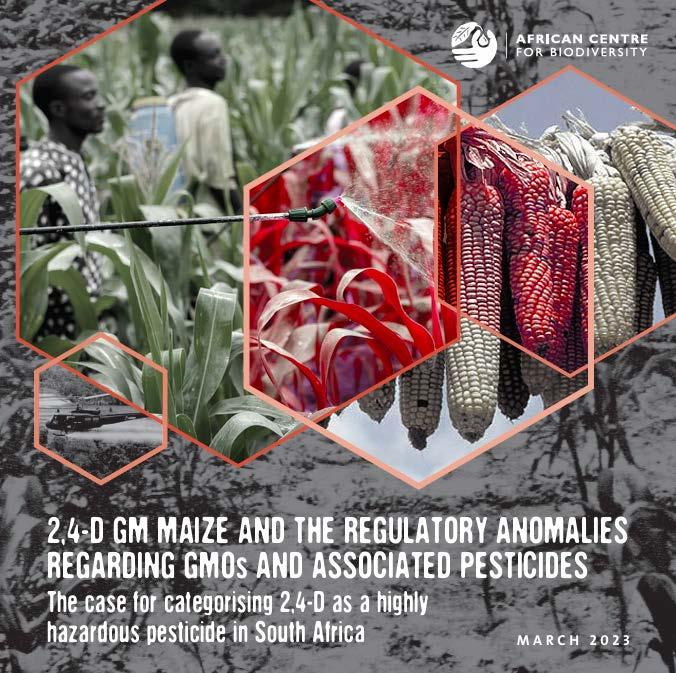
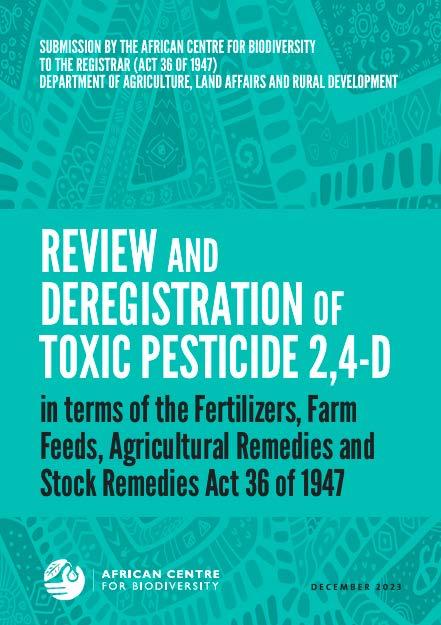
Food Sovereignty Ghana (FSG) & 3 others vs National Biosafety Committee
Following on from the ACB’s strong support of this court case – Ghana’s first legal challenge of genetic engineering in food – seeking the country’s Supreme Court’s interpretation of aspects of the law, and also declaring that identified aspects are inconsistent with the country’s Constitution and international conventions to which the country is a Party – judgment was meant to be handed down on 24 May but, at the time of writing, this had not yet happened.
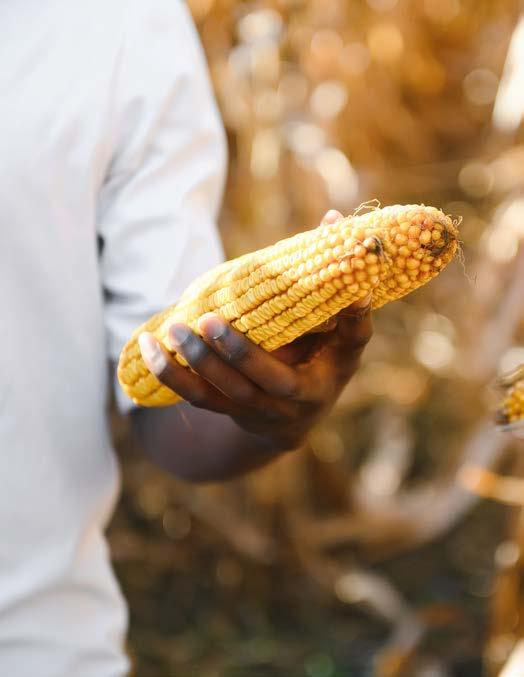
The ACB continued to work on political and policy processes at regional and national levels to promote FMSS, FR and agricultural biodiversity, to benefit marginalised and resource-poor communities, whose livelihoods and rights to food and nutrition security can be enhanced through increased seed diversification and sovereignty, equitable access and agroecological resources.
On the international level, we attended the tenth Governing Body (GB10) meeting of the ITPGRFA in Rome, as well as a Global Symposium on FR in India.
We continued our research on seed
harmonisation with the release of a publication analysing the efforts to harmonise seed in Eastern and Southern Africa
Through work towards the development of progressive seed laws and policies, CSOs have an understanding of and resistance against the corporate-driven International Union for the Protection of New Varieties of Plants (UPOV) 1991.
We co-hosted a regional meeting on Safeguarding FR and published a report following the Zimbabwe farmer-to-farmer exchange
The ACB attended the Africa Group Regional Preparatory (AGP) meeting in Kenya and then attended the GB10 meeting of the ITPGRFA in Rome in November, where we also participated in a side event: Removing the bottlenecks: How to create space for farmer-managed seeds. We also supported the attendance of a farmer from Benin, who is a member of La Via Campesina’s (LVC’s) International Planning Committee for Food Sovereignty (IPC).
In our consolidated contribution, the CSO group noted the pressure on Africa from UPOV and at country level, to adopt seed laws that restrict the implementation of farmers’ rights enshrined in Article 9 of the Treaty.
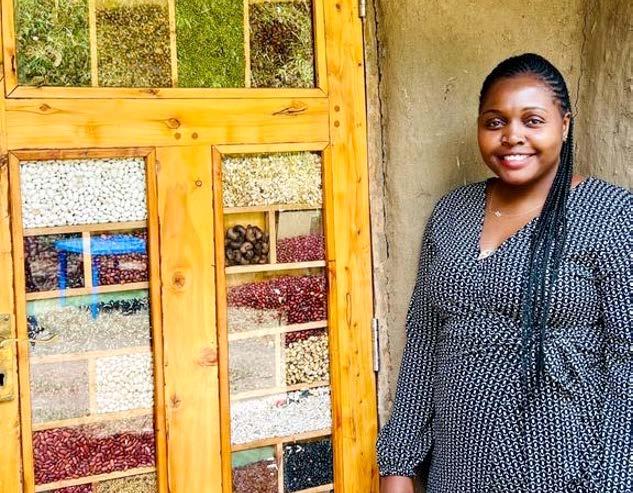
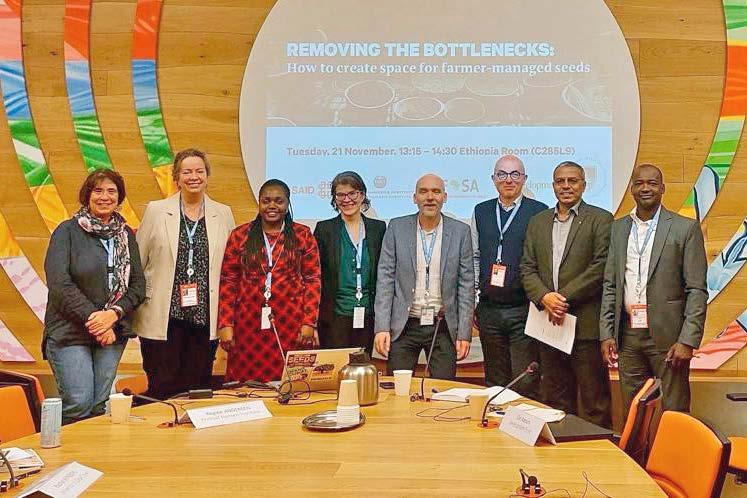
As an example, in Kenya smallholder farmers have petitioned the government regarding their Seed and Plant Varieties Act contravening the provisions of the constitution and the Treaty, by unreasonably restricting FR. Kenya is one of nearly half of African countries that have never submitted a compliance report to the Treaty, which shows a worrying lack of commitment in Africa to the Treaty. One of the recommendations to emerge is for countries to support FMSS for traditional varieties and create autonomous production and marketing value chains to improve farm incomes and strengthen local food systems.
The ACB, together with other CSO groups that attended the AGP Nairobi meeting, visited SSN‘s community seed bank and training centre in Gilgil. This organisation works with 74 000 farmers practising agroecology and their community seed bank stores more than 900 deposits of farmer seed, including grain, pulses and vegetables.
Prior to GB10, the ACB also attended this symposium in September in India and the IPC’s preparation meeting for the symposium and the ITPGRFA GB10.
Highlighted was the importance of enhancing farmers’ participation in decision-making processes, and the need to strengthen FMSS and ensure farmers gain from the sharing of benefits, thereby making advancements in the realising of FR. Identified actions included establishing platforms for farmer exchanges and formulating voluntary guidelines tailored to each country’s unique needs. The impact of digital sequence information (DSI) on FR received attention, with participants deliberating on how to prevent the private sector from violating these rights.

The GB session is a biennial international meeting, where Parties to the Treaty and observers meet to address and make decisions on a range of items critical to the Treaty’s implementation, such as governance of agricultural biodiversity and global food security. This is the third time the ACB has participated in the Africa Region consultation process and the fourth time to attend the GB session.
We attended the previous AGP meeting in Ethiopia and GB9 in India in 2022, as a registered observer. The ACB ‘s participation and submissions to the inventory on best practices and measures to implement FR, as produced by the Ad Hoc Technical Experts Group on FR (AHTEG-FR), is a vital part of our work on the recognition, protection and implementation of FR on the continent.
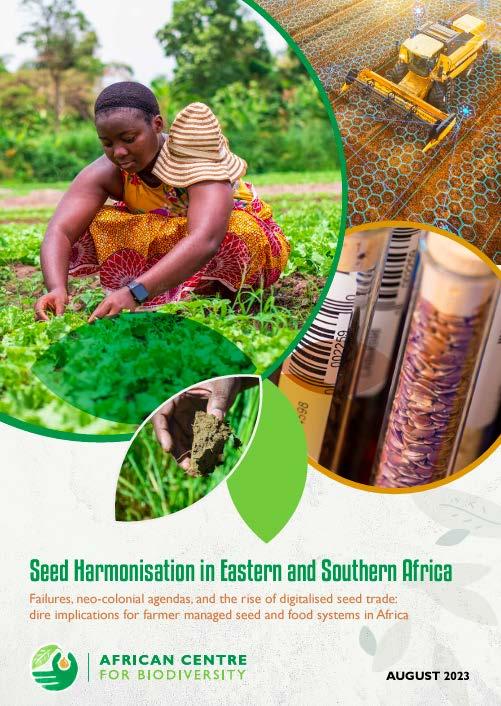
In August we released, Seed harmonisation in Eastern and SouthernAfrica – failures, corporate occupation, and the Rise of digitalised seed trade: dire implications for farmermanaged Seed and food systems inAfrica 11
Our research finds that seed marketing harmonisation processes are supported and thus influenced by, inter alia, international development agencies and the Gates Foundation-funded Alliance for a Green Revolution in Africa (AGRA). Meanwhile, plant variety protection (PVP) harmonisation effort have not made strides, either in the cases of the Southern African Development Community (SADC) or Arusha PVP protocols, which are based on UPOV 1991. The dominance of multinational corporations (MNCs) in regional seed catalogues raises serious concerns about corporate occupation and how regional seed harmonisation efforts provide platforms for multinational companies to expand their footprint.
Based on this work, the government in Zanzibar requested the ACB and partners in Tanzania to work with small-scale farmers to draft a unique/discreet law for FMSS.
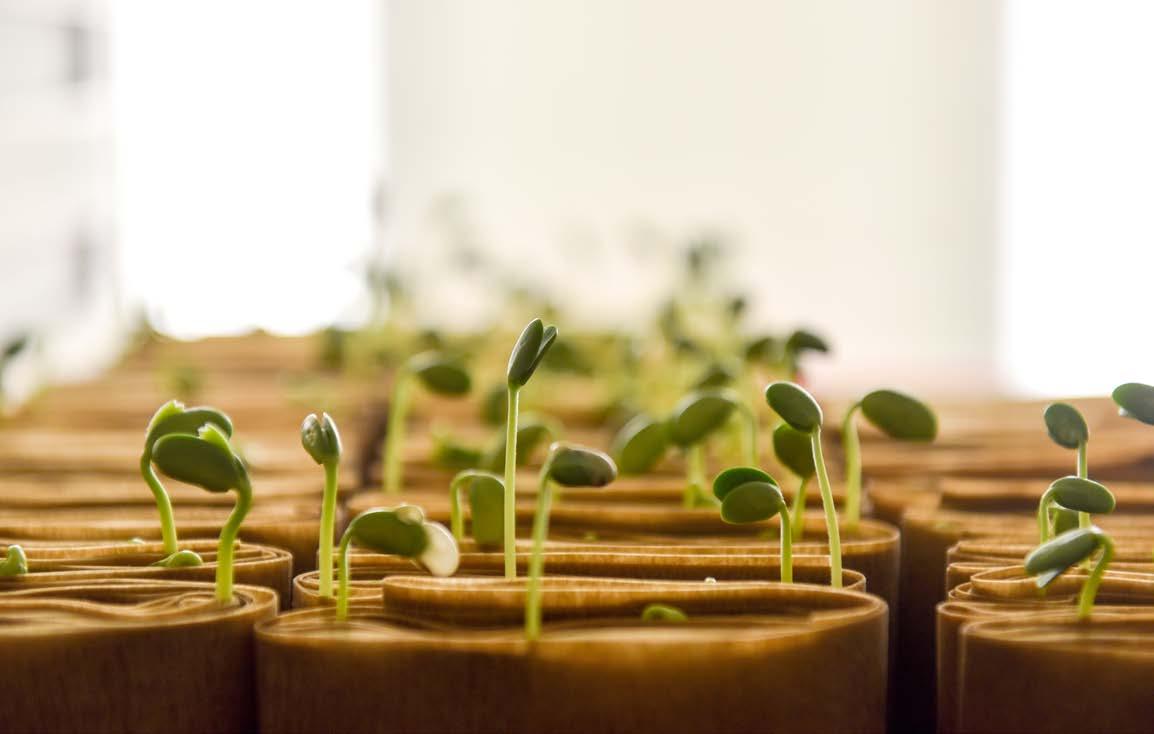
In March, the United Nations Food and Agriculture Organisation (FAO)’s Seeds and Plant Genetic Resources team hosted an Informal Expert Consultation on the impact of seed policies, laws and regulations on farmers’ ability to access seeds and planting materials of diverse, locally adapted varieties, including farmers’ varieties/landraces, in Rome, to elicit inputs on the draft concept note around the questions, methodology and process for oversight and validation of the research. The ACB was one of a diverse range of global experts invited to revise the concept note before it was presented to the Working Group for their consideration. Key questions for the research were discussed, along with factors that can affect and possibly improve farmers’ ability to access and use seeds and planting materials of locally adapted crop varieties, including farmers’ varieties/ landraces. There was a consensus around the need to focus on what farmers’ preferences are and what they want.

Regional seed policy harmonisation processes on seed and PVP legislation have been underway for 15 years in Africa, eliciting an extensive body of research and advocacy undertaken by the ACB and numerous African CSOs. 12 The ACB took the initial lead on the African Continental Seed Harmonisation process by the African Union (AU), which is targeted at harmonising seed regulatory frameworks, beginning with the establishment of guidelines. We also dealt with the Intellectual Property Protocol of the AU’s Continental Free Trade Area Agreement (AfCFTA) and the dangers in seed harmonisation moving not only to the AU level but also that it is increasingly becoming digitalised. 13
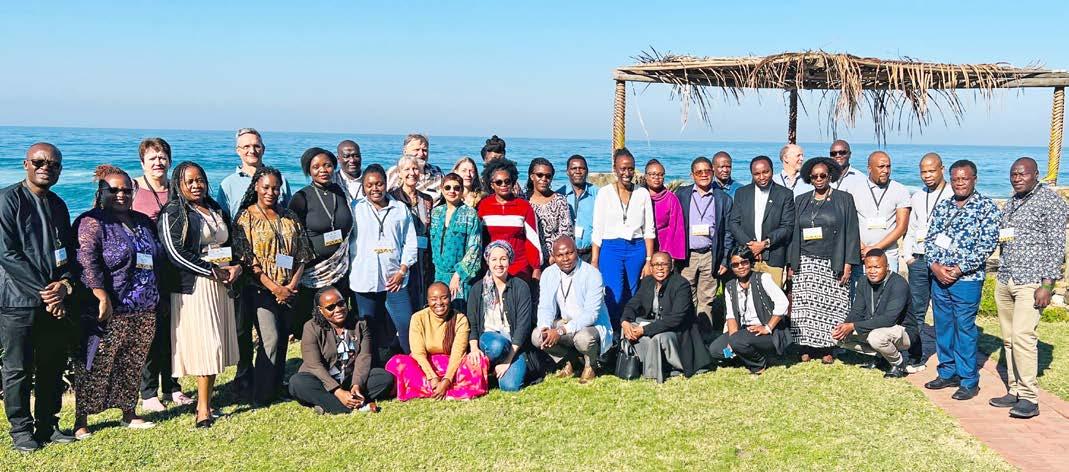
Together with the Association for Plant Breeding for the Benefit of Society (APBREBES) and Community Technology Development Organisation (CTDO), we hosted a regional meeting in South Africa in June, focusing on seed laws and policies, which included CSOs and government officials.
The workshop’s key focus was to critically review, analyse and consider the impact of current seed laws and plant breeders’ rights in East and Southern Africa
– how to strengthen FMSS and FR and to foster policy and legislative support to advance FMSS. This begins with supporting farmers’ seed varieties and with organising farmers to conserve and sustainably use genetic resources for food and agriculture.
Participants exchanged on how their respective countries’ contexts and developments differed, in terms of:
• experiences from governments;
• learning about the differing policies and laws that affect FMSS; specifically, the varying definitions of formal and informal seed, and their impact on FR;
• contextual information on international treaties and the challenges these pose for seed systems; and
• legal frameworks on the continent and the state of farmers’ seed varieties.
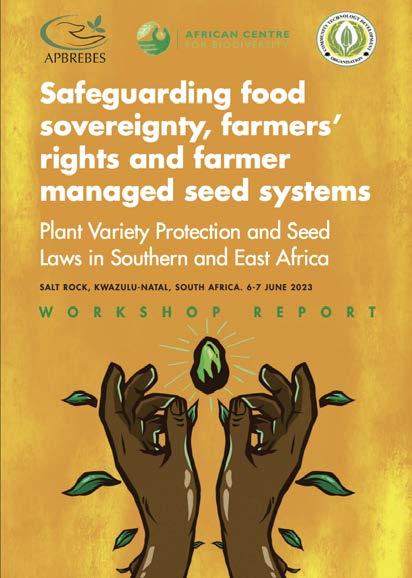
G ene banks and seed systems aim to explore sustainable options for increasing farmers ’ access to crop genetic diversity from gene banks
In April, Masinjila was a facilitator at a workshop to introduce Biodiversity for Opportunities, Livelihoods and Development (BOLD). Under this project, gene banks and seed systems aim to explore sustainable options for increasing farmers’ access to crop genetic diversity from gene banks.
To date, there has been little development despite the SADC Seed Committee agreeing in 2020 on the need to undertake extensive consultations with member states and all stakeholders regarding steps and guidelines for the process of registration of farmers’ varieties. It appears this process has been hamstrung due to lack of funding.
Long-time ally CTDO collaborated with the government on the Zimbabwe National Strategy and Action Plan for Plant Genetic Resources for Food and Agriculture (2022-2032), which aims to establish a legal and institutional framework for the management of plant genetic resources for food and agriculture. An inception workshop was held as a basis to work towards a paper of recommendations to submit to the government, which Masinjila attended.
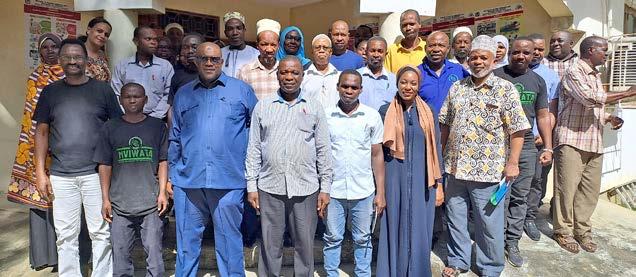
In May, the ACB, in collaboration with the National Network of Small-Scale Farmers Groups in Tanzania (MVIWATA) and the Zanzibar Fruit and Vegetable Growers Association (UWAMWIMA), co-hosted a meeting on the draft Zanzibar seed law, bringing smallholder farmers and government officials together.
Mozambique’s seed legislation
Mozambique is in the process of a first attempt to formulate a National Seed Policy and the ACB was asked by Mozambican farmers and CSOs to comment on the draft seed policy and draft seed law. We drew up a submission,15 commenting that the draft policy does not recognise the role played by the three million small-scale farmers who provide 95% of the food consumed, ignoring their priorities and rights. Rather, it follows the model of typical commercial seed legislation by proposing stringent rules and standards for the regulation of the formal/commercial seed sector.
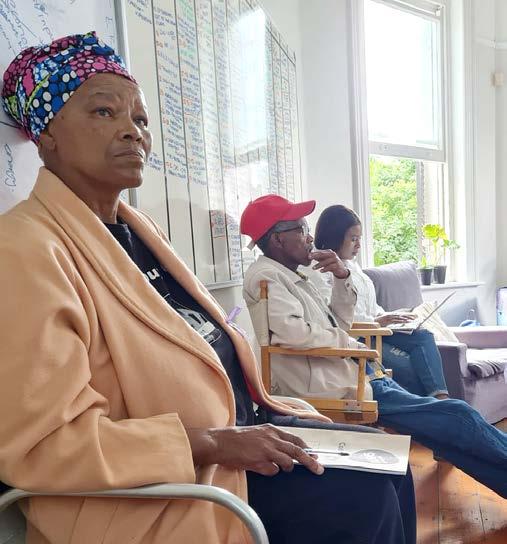


When the acts were first promulgated, we released briefing papers on the two laws 17 and after the draft regulations were released, we submitted detailed comments, 18 where we did note that the laws offered some degree of regulatory space for the continued existence of FMSS and the right to reuse, exchange and sell seed, as set out under Article 9(3) of the ITPGRFA. This came after a long journey of robust civil society advocacy and activism, following the revision of the 1976 versions of both laws. The engagement by the ACB, along with other civil society and farmer groups has included:
. Numerous submissions and briefings; 19
. Informing 20 and mobilising 21 farmers and CSOs to make submissions and sign petitions; 22
. Participating in national consultations and provincial hearings;
. Presenting at public hearings; and
. Attending parliamentary deliberations. 23
A2022blog,Breakingfromtherestofthecontinent:SouthAfricamovestowardsrecognising smallholderfarmers’RighttoSeedandfarmerseedsystems , recounts some of this story. 24
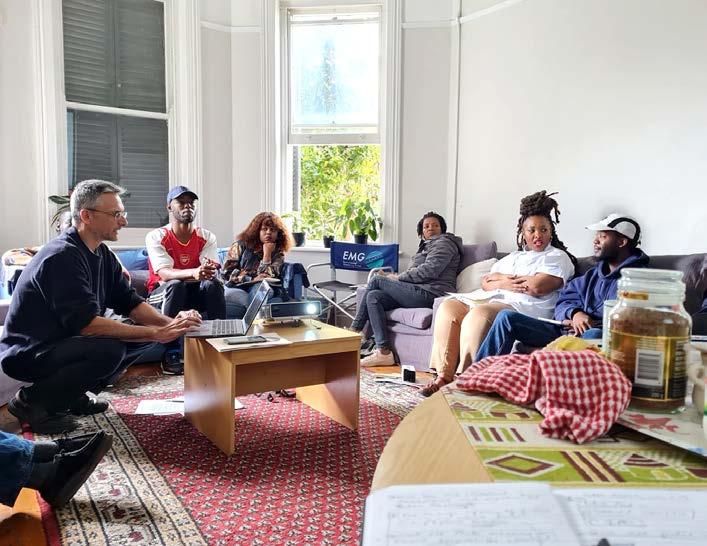
The South African Plant Improvement Act (PIA) and the Plant Breeders’ Rights (PBRA) were promulgated in 2018 and publicly available in 2019. In November 2023, the Department of Agriculture, Land Reform and Rural Development (DALRRD) hosted stakeholder consultations in Pretoria and Cape Town on the regulations. We mobilised partners to participate and attended both consultations, where we made inputs in the plenary sessions and breakaway groups. In December, we submitted further comments.16
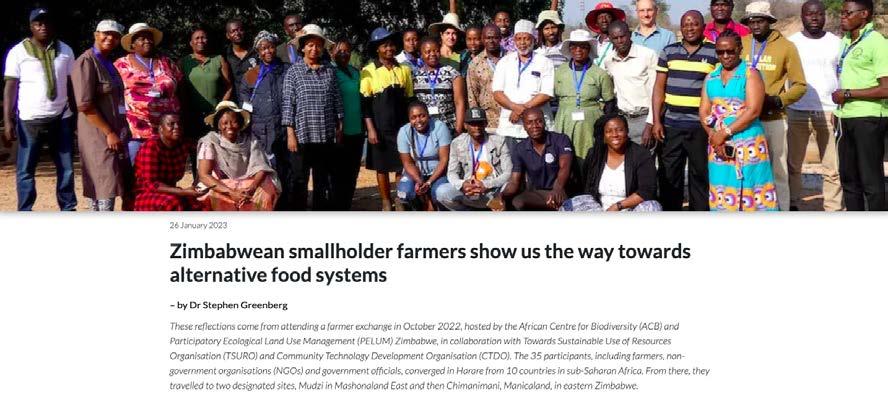
Following on from the farmer-to-farmer exchange we co-hosted in late 2022, in collaboration with Participatory Ecological Land Use Management (PELUM) Zimbabwe, Towards Sustainable Use of Resources Organisation (TSURO) and CTDO, in January, we published a report, Zimbabwean smallholder farmers show us the way towards alternative food systems25 and a blog.26 Photos from the exchange are available in a Flickr album.27
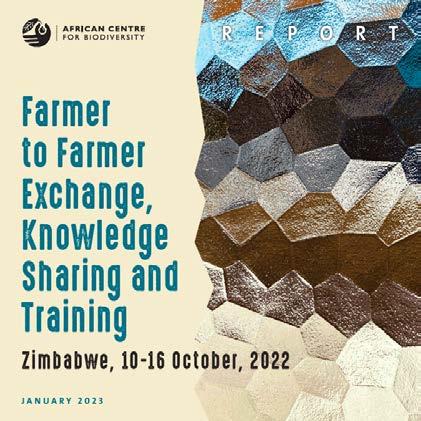
In the past decade there have been major policy shifts in the Kenyan seed/ agricultural sector due to the push for agricultural industrialisation
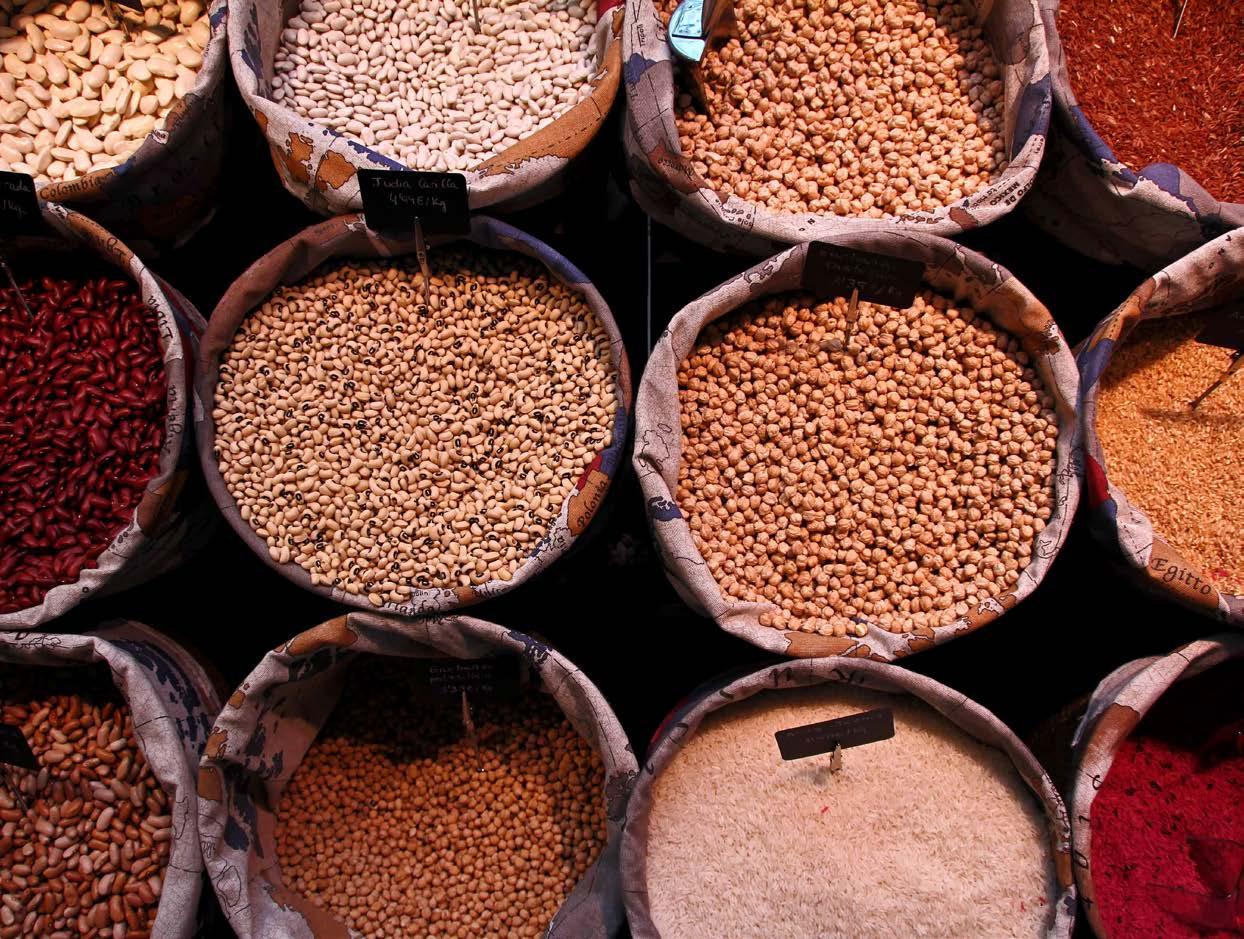
Kenya Seed Learning and Knowledge Exchange series
The Biodiversity and Biosafety Association of Kenya (BIBA-K), in collaboration with the ACB, hosted a webinar series, Kenya seed learning and knowledge exchange series, over three sessions.
In the past decade there have been major policy shifts in the Kenyan seed/agricultural sector due to the push for agricultural industrialisation, aided by draconian legislation such as the Seed and Plant Varieties Act of 2012 and Crops Act of 2013, which criminalise FMSS. More recently, a 10-year ban on the importation of GMOs has been overturned. Thus, the aim was to exchange knowledge on Kenya’s current agricultural and seed policy landscape, helping to increase awareness of key issues to advocate for better policies to protect smallholder farmers and FMSS.
Masinjila was the keynote speaker at a webinar on seed hosted the Alliance for Food Sovereignty in Africa (AFSA), which looked at the threat of foreign influence in African policy and development agendas and the massive uptick in efforts to harmonise Africa’s seed policies.
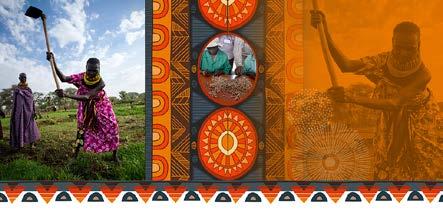
KENYA SEED LEARNING AND KNOWLEDGE EXCHANGE SERIES

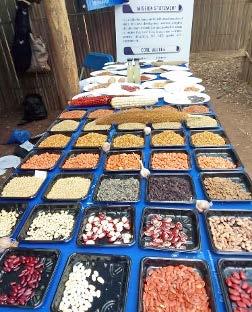
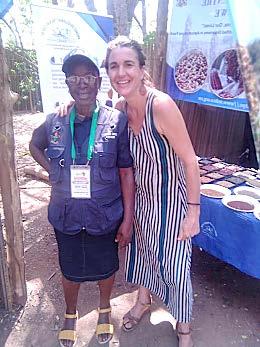
Africa Peasants’ Seed Fair
This year the fair was held in Benin and the theme was: Food sovereignty: people’s rights in the face of the rise of GMOs in Africa. The ACB supported two Zimbabwean farmers to attend and submitted a recorded presentation on GMOs and FR. You can read more in the English/French blog.28
#STOPUPOV
A global alliance of CSOs and farmer-led movements mobilise annually against restrictions imposed on farmers’ seed, which is largely driven by the UPOV 1991 PVP regime. The convenors include the ACB, Alianza Biodiversidad, APBREBES, Coalition pour le Patrimoine Génétique Africaine, ETC Group, Friends of the Earth International, GRAIN, La Via Campesina (LVC) and the Stop Golden Rice Network. This annual campaign peaks in early December, with a range of events held all around the globe. This year, we published a joint statement29 in English, French, Spanish and Arabic. The #StopUPOV Facebook group30 now has 1,100 members, which are mostly organisations.
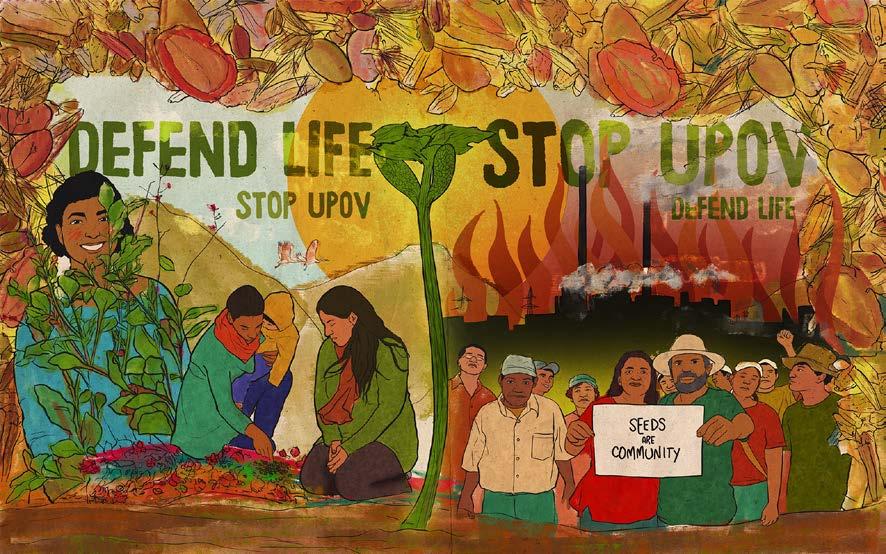
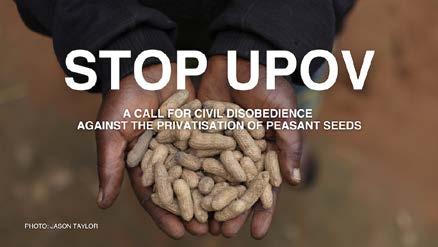
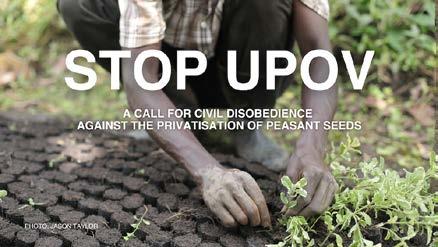
Produced by Rosa-Luxemburg-Stiftung in association with AFSA, Biowatch and PELUM Tanzania, The Last Seed32 is a documentary film featuring Mayet as a key voice advocating for seed sovereignty in Africa. The film outlines the far-reaching consequences of corporate greed on farmer seed and helps us reflect on the vital importance of seed and the need to protect and support FMSS.
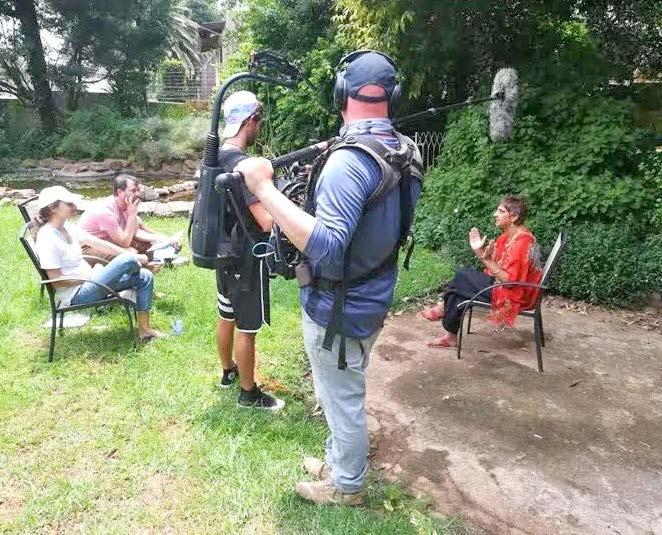
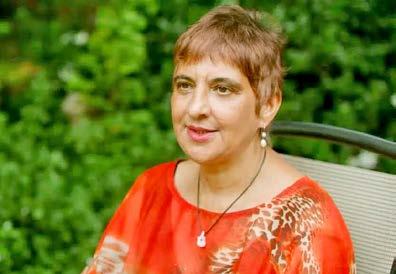

This is the fourth year that the ACB has participated in the campaign, which started with the support and engagement of 348 organisations coming together in 2020 31
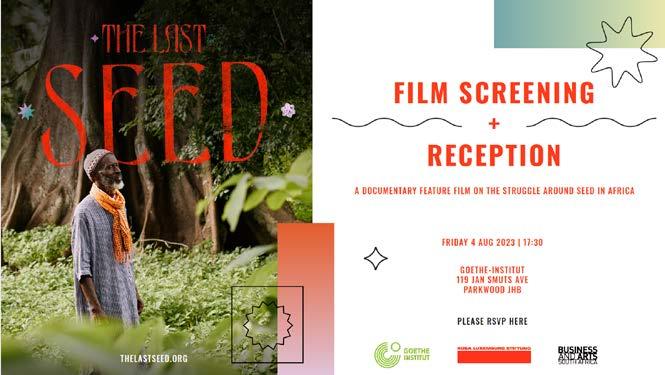
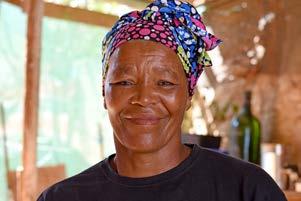
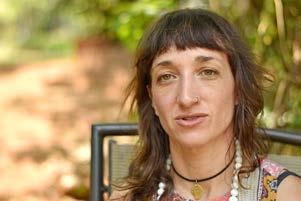
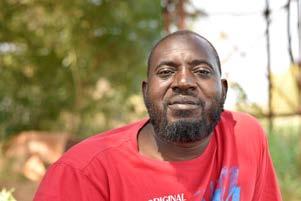
ACB seed film
The ACB is producing a film on seed. Filming is complete and editing underway. This will also serve as a legacy project that looks back at ACB’s activism on the seed front over many years.
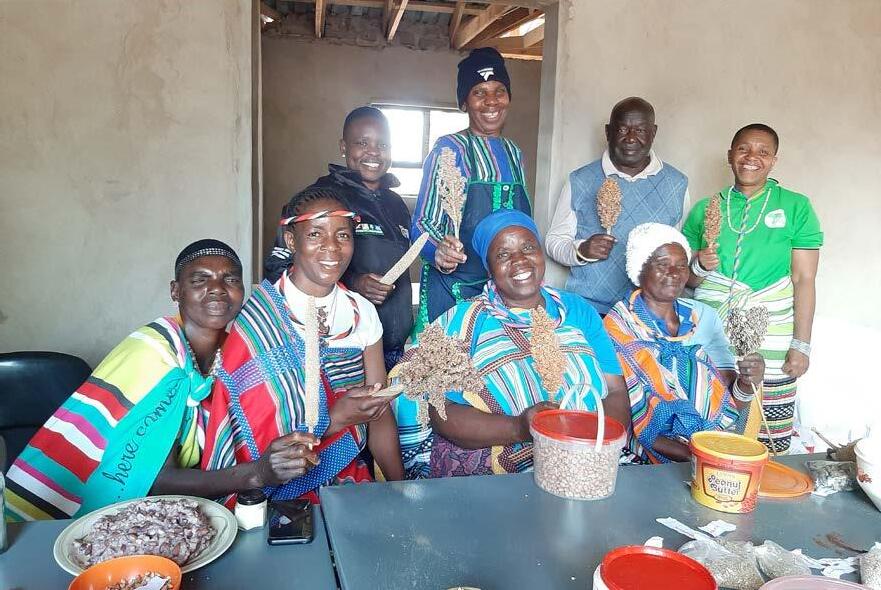
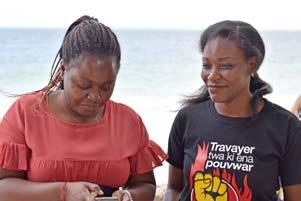
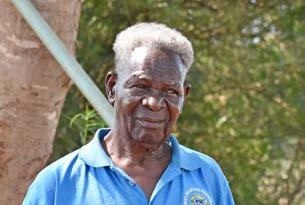
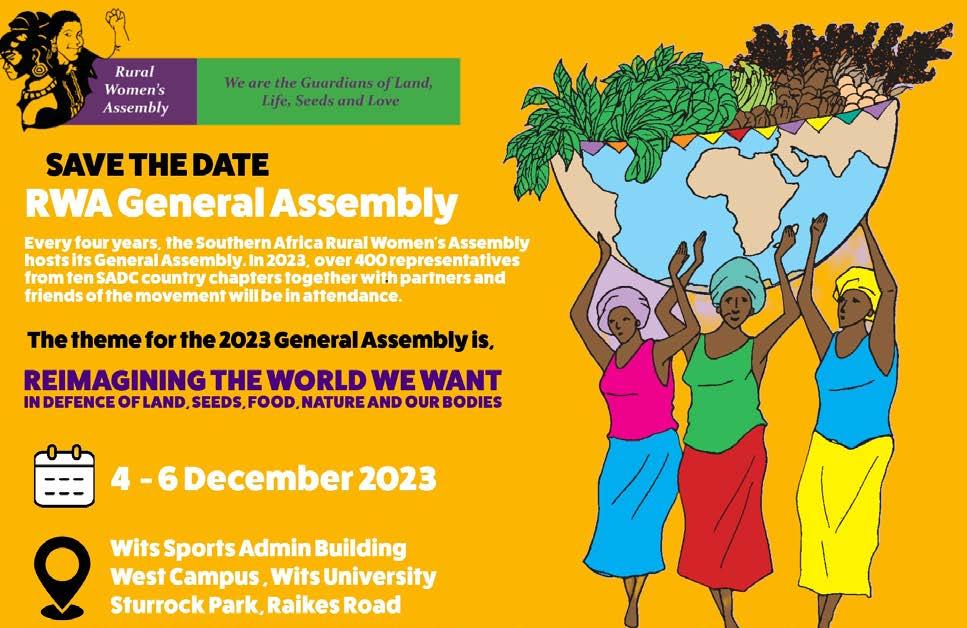
Reimagining the world we want
Every four years the Southern African Rural Women’s Assembly hosts a general assembly. Mayet was invited to present on: Seeds, food sovereignty, and climate justice in SouthernAfrica
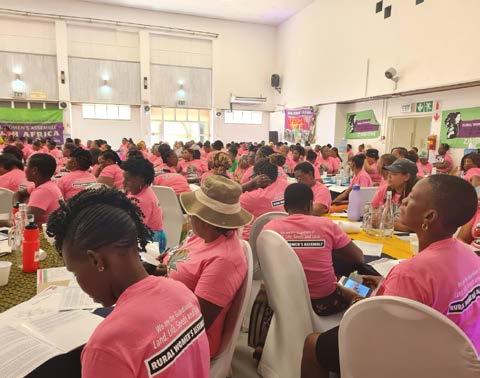
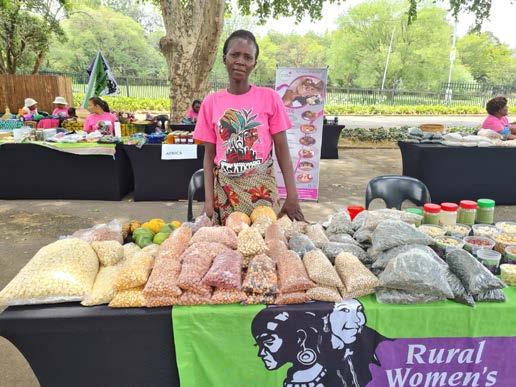
Highlights
• Attending a Ministerial debrief on outcomes following the finalisation of the Kunming-Montreal GBF and releasing a publication that unpacks the outcomes of COP 15.
• Participation at the CBD’s 25th SBSTTA and contributions to ECO, the newsletter of the CBD Alliance (CBDA).
• Hosting a South-South Dialogue in Zanzibar, for thought leaders from Africa, Asia, and Latin America to discuss the intersection of biodiversity, climate change, and agriculture and food systems.
• Analysis of the status of digital agriculture in Africa and the impact of financialisation and dematerialisation.
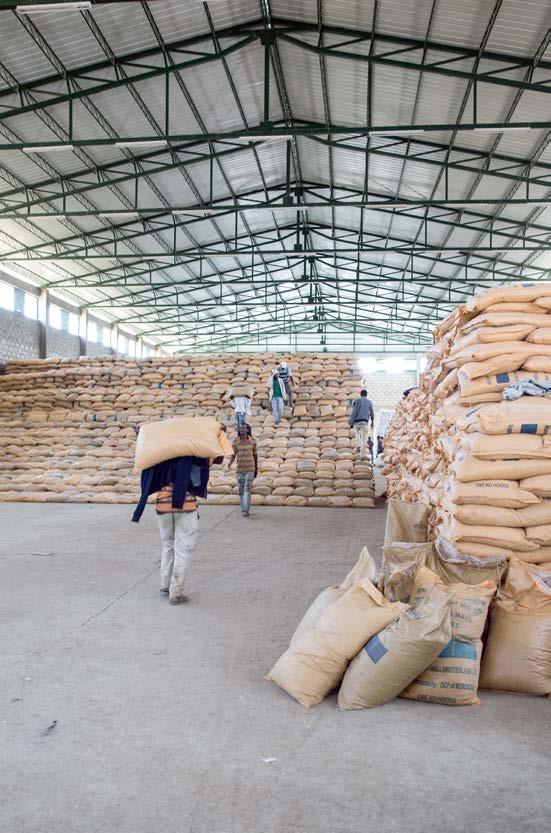
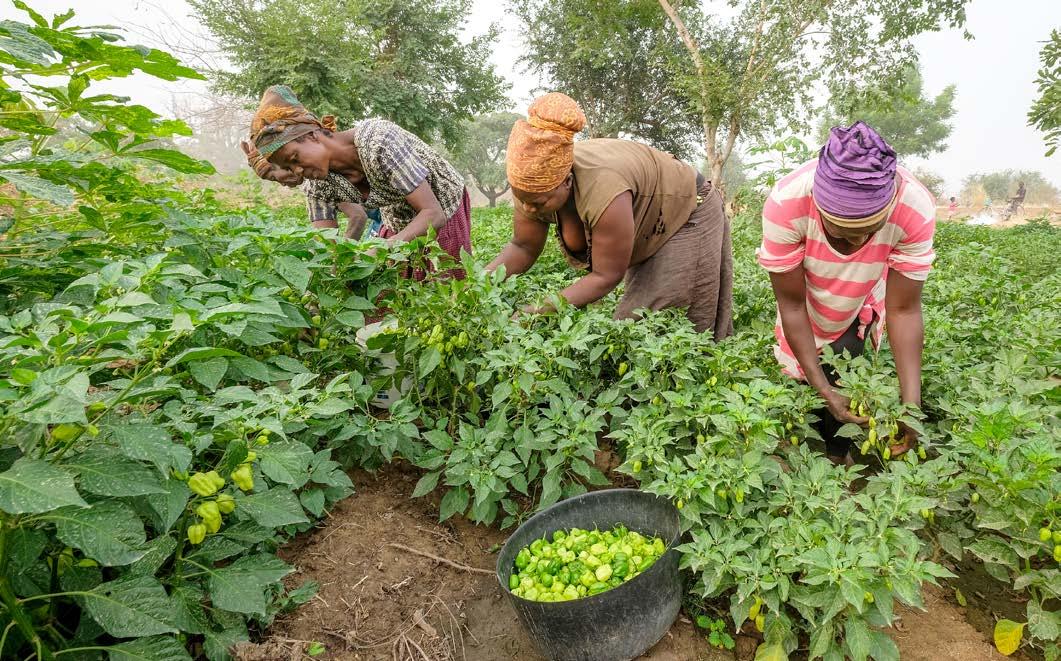
• Collective activism within the Unpoison network, calling on the SA government to ban HHPs that are disallowed in other countries and to update the regulatory framework.
• Launch of our series on ultraprocessed food (UPF) in Africa, with the release of the first two fact sheets.
• Co-hosting a national policy dialogue on just transition and adaptation in the SA food system, with the release of a series of fact sheets and a report.
• Engagement with the SA government to draft an agroecology strategy.
The ACB’s critical voice against corporate expansion, capture and control of African seed and food systems and encouragement for the transition towards agroecology, received increased support from CSOs and governments. We continued to create working relationships on agroecology, seed systems and FR at national, regional and international levels. This shaped platforms for joint planning and reflection for better coordination with governments and other stakeholders, while creating a collective voice at the regional level on these issues. Thus, the key objective of movement building was strengthened. Indeed, the ACB’s track record, credibility and legitimacy continue to earn the reputation of having considerable convening power.
In February, represented by Masinjila, the ACB attended the online Ministerial debrief to discuss the outcomes of the Kunming-Montreal GBF adopted at COP 15 in December 2022; the means of implementation linked to biodiversity funding and sourcing of public and private sector resources; DSI; biodiversity and climate change; and a presentation on the implementation plan for the SA government.
In the same month, Masinjila joined CBDA members to provide an update and critical analysis of the GBF and related decisions, as one of four presenters. Her presentation: Synbio, techno-fixes, and false solutions need to be challenged nationally, can be watched online.33
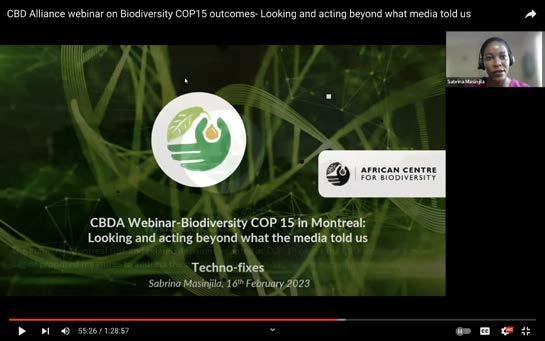
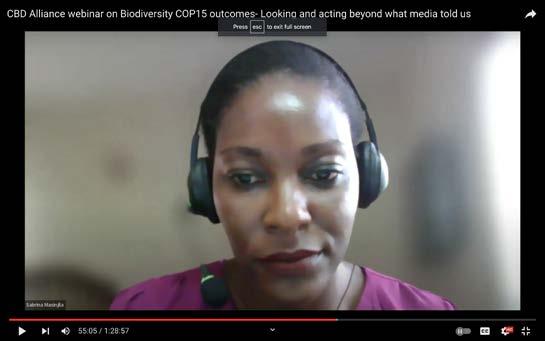
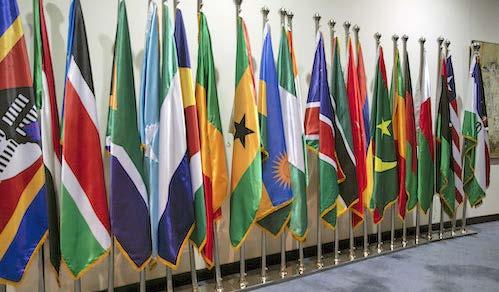
Ongoing discussions with partners led to Mayet and Masinjila attending a meeting hosted by the Third World Network (TWN) in collaboration with Sahabat Alam Malaysia (SAM) in Malaysia in July. The ACB supported the participation of two colleagues, Yemi Katerere and Simangele Msweli from the African CSOs Biodiversity Alliance (ACBA). The main objectives were to identify priority areas and collective actions needed beyond the CBD and the GBF to effect real change and included discussions on the outcomes of the CBD, including rights-based approaches in the GBF, nature-based solutions (NbS), resource

mobilisation, and the need to fill financial gaps through offsets (carbon and biodiversity) and debt swaps.
We also discussed agroecology and linkages with agriculture biodiversity; how agroecology is being co-opted and linked to deforestation under EU projects; the move towards certification of agroecology by countries; and how huge funding is being directed to agroecology through the International Fund for Agricultural Development – in the case of Colombia.
In the climate space, artificial intelligence (AI), biotech and agriculture will be part of future negotiations.
Our work in the last four years, engaging with multilateral negotiations to craft a GBF under the auspices of the CBD, has resulted in the ACB contributing substantially to national, regional and international discourses. The GBF offers several concrete targets to achieve biodiversity conservation and sustainable use, including a strong call for the integration of biodiversity, climate change and food systems sustainability interventions. Nevertheless, contradictory concepts are sprinkled throughout the framework and discussions around the Green Climate Fund have been conflated and brought into the CBD space under the title of resource mobilisation. In recognition that greater clarity on the convergence of climate change and biodiversity discourses and implications is needed, our engagement has focused on the opportunities for progressive responses.
A significant area of growth has been our work under the CBD, in particular the multilateral negotiations to craft a GBF.34 We have worked on a range of intersecting issues directly with key African government negotiators and, through network partners, made several interventions in the formal negotiations, as well as participating in side events – such as linking the issues related to GM and biosafety.
In December 2022, Masinjila attended COP 15 in person, supported by then ACB research and advocacy officer Linzi Lewis and Mayet, who attended online. The negotiations were contentious, with the meetings divided into the Open-Ended Working Group (OEWG) 5, which largely discussed the GBF, and the COP 15, which included all the aspects of the CBD, including the GBF.
The ACB provided strong inputs into CSO positions. Our continuous contributions to Target 10 resulted in the adoption of agroecology in the text. The learnings have also been indispensable in widening the knowledge base of the ACB, especially regarding the confluence with climate change discussions. The ACB also participated in CSO preparatory meetings daily through the CBDA and in several side events, as well as being part of a delegation under the CBDA that met with UN SecretaryGeneral António Guterres to raise several concerns.
The ACB participated in the CBD’s 25th meeting35 of the Subsidiary Body on Scientific, Technical and Technological Advice (SBSTTA) in Kenya,36 in October, represented by Masinjila. Key items on the agenda included biodiversity and climate change. In this regard, the ACB urged African governments to consider the interconnectedness of agricultural biodiversity, farmers’ rights, food systems and climate change. We warned that parties need to avoid marketbased solutions that promote the financialisation of nature, and made two contributions to CBDA’s newsletter, ECO:
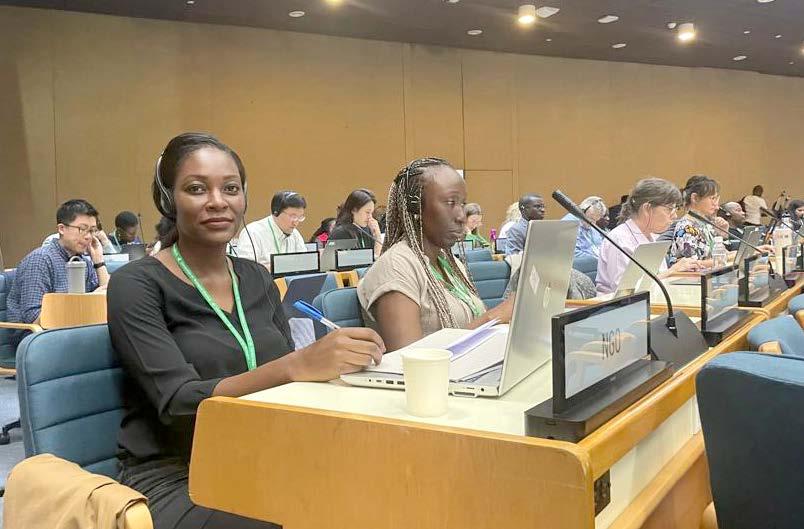
Governments urged to consider interconnectedness between agricultural biodiversity, farmers’ rights, food systems and climate change 37
The explicit mention of agroecology under Target 10 of the Global Diversity Framework, and the in-situ conservation of agricultural biodiversity implicit in Target 4, makes a compelling case for Parties to develop further work regarding agroecological farming practices.
NbS, the myth of a solution for our multiple crises: financialisation of nature won’t solve the crisis - agroecology will 38
NbS has attracted the largest share of public and private funding directed to net zero schemes and carbon offsets. This monetises and commodifies nature and emissions, and further separates humans from our actions and responsibilities. Further to this, the financial sector investment in land management schemes has led to the displacement of local and indigenous peoples and widespread human rights violations. The focus here is on mechanisms for financing, rather than impacts on people on the ground.
The ACB attended the ETC forum, Uncovering trends and agendas on geoengineering and agricultural digitalisation and the corporate narratives underpinning these technofixes, organised in collaboration with African Technology Assessment Platform (AfriTAP) and aiming to share information on geoengineering and agricultural digitalisation. Masinjila also spoke at a side event, hosted by the ETC Group and Health of Mother Earth Foundation (HOMEF) Nigeria, in collaboration with the CBDA. The event aimed to affirm the CBD’s leadership in taking precautionary decisions on geoengineering, urging the world to take real climate action and avoid false solutions.
Cultivating diversity for a just agroecological transition in Africa
With attention shifted to developing monitoring frameworks and resource mobilisation for the implementation of the GBF, in this August briefing39 we note that national-level civil society advocacy efforts, consultations and participation are urgently needed to ensure agroecology, agricultural biodiversity and the rights of farmers are fully integrated into revised National Biodiversity Strategies and Action Plans (NBSAPs).
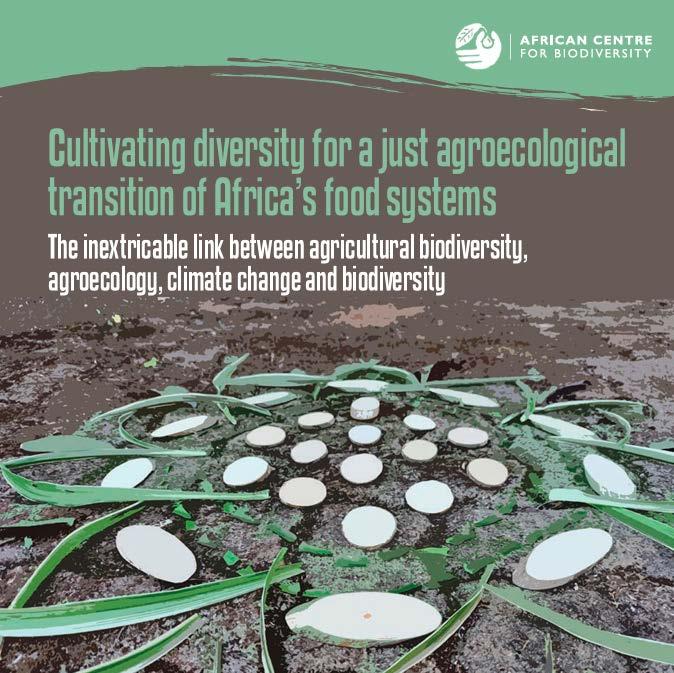
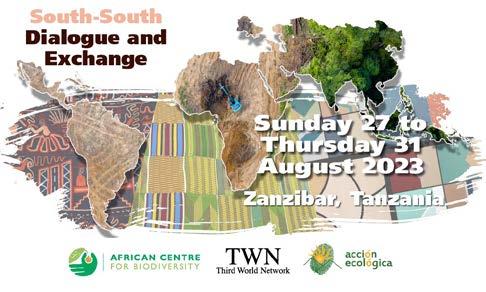
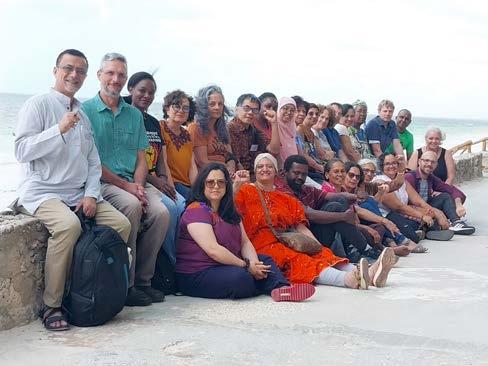
The ACB, Accion Ecologica and TWN hosted a three-day South-South dialogue and exchange in August in Zanzibar, attended by 30 activist thought leaders. The meeting focused on the intersections between biodiversity, climate change, agriculture and food systems, and aimed to strengthen and network uniquely global south understandings and the critical alternatives needed.
Outcomes include collaboration regarding case studies involving protected areas, biodiversity conservation, financialisation of nature – especially regarding biodiversity offsets and other financialisation instruments, such as debt for nature swaps – and diverse advocacy strategies cutting across the various intersecting issues that will form the subject of a great deal of our future work.
Mayet was invited to attend a global meeting of the six working groups of the international peasants’ movement LVC’s IPC, along with several other hand-picked and vetted allies from the Global North and South. The purpose was to discuss the actions to be undertaken towards Nyéléni 2025,40 to be held in India. This multi-year process (2023-2025) involves popular consultations and regional discussions, shaped by the IPC and other movements concerned about the disrespect for human rights and our planet. It is expected that thousands of grassroots organisations and new allies will be brought together to discuss and put forward a strong food sovereignty and climate, environmental, social, racial and gender justice political agenda for the years to come.
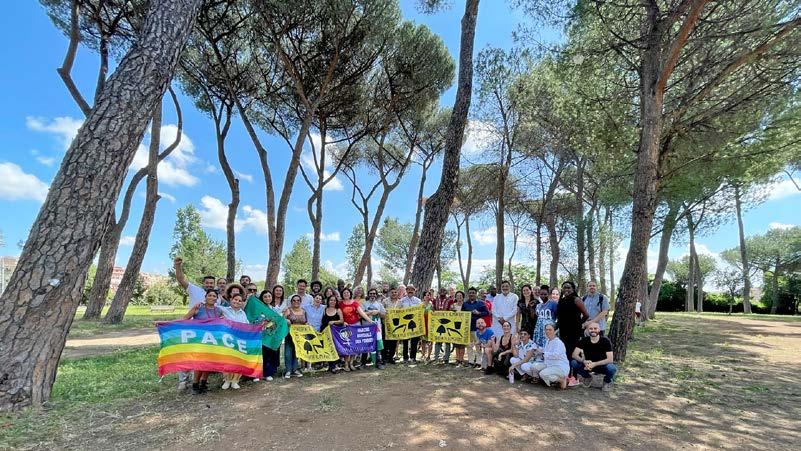
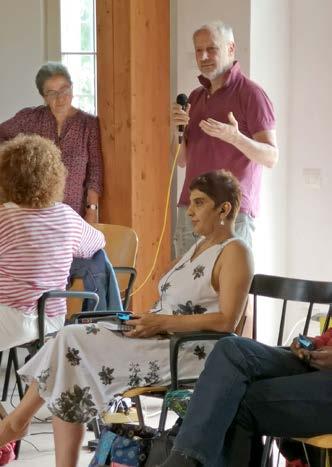
In March, over three sessions, we held a joint global webinar series with partners in Latin America, Europe, Africa and Asia, to reflect on what we understand by nature – its rights, practical experiences of defence and strategies to confront the instrumentalisation to which nature is subjected by capital. There was interpretation between English, Spanish and French.
The first session, which included Vandana Shiva on the panel, centred on, Different ontologies of nature, where we shared reflections on what we understand by nature, its rights, the practical experiences of defence and the strategies to face the instrumentalisation of which nature is subjected by capital. Then the second session looked at the Rights of nature in practice and the third session was on Commodification and financialisation of nature.
International negotiations on biodiversity and climate change are increasingly focused on treaties on trade in nature, rather than on mechanisms that allow recognition of the need for social justice in the natural space that human beings inhabit, in harmony with other elements. Masinjila’s presentation was titled, Reflections on what we understand by nature, its rights, and practical experiences of defence and strategies to confront the instrumentalisation to which nature is subjected by capital.
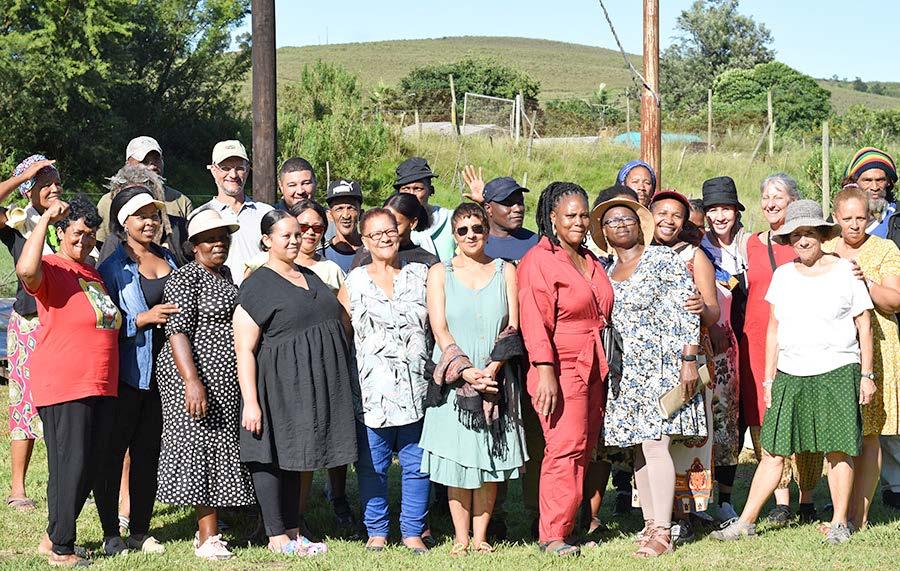
Pushing for just a just transition in food systems in SA
Following on from a strategy meeting in November 2022, hosted by the Environmental Monitoring Group (EMG) in Cape Town, together with the Trust for Community Outreach and Education (TCOE), Tshintsha Amakhaya (TA), Surplus People Project and the ACB, EMG hosted a national meeting on Agroecology, climate change, and intersecting issues in Suurbraak, Western Cape, in February to initiate consultations with a wider group of farmer organisations and CSOs.
A mandate was obtained from frontline communities regarding future work towards a national agroecology strategy.
In the same month, at the Agriculture and Agro-processing Master Plan (AAMP) meeting, hosted by the Centre for Coordination of Agricultural Research and Development for Southern Africa (CCARDESA), Dr Stephen Greenberg represented the ACB and presented on agroecology to SADC directors of agricultural research and extension, and deans of faculties of agriculture in the region.
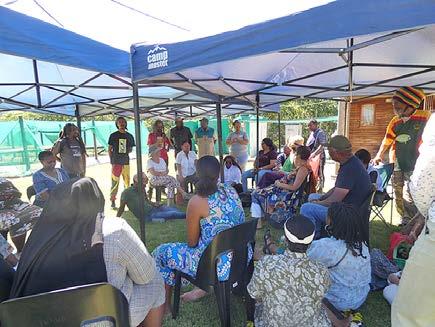
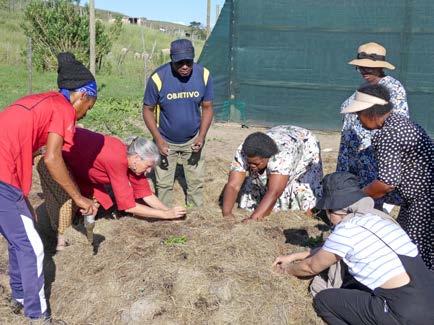
Assessment of support for agroecology in SA’s policy landscape
Then, in March, CSOs and farmers met with the Portfolio Committee on Agriculture, Land Reform and Rural Development to share views on agroecology and to promote a call from 58 organisations for a national agroecology strategy.41
In support of the process, the ACB conducted a detailed review of 22 key policies across agriculture, environment, and other sectors to identify strengths and weaknesses of the existing suite of policies in SA, in the context of ongoing biodiversity loss, the climate crisis and an increasingly unsustainable agri-food system. We were pleased to share a detailed report42 and policy brief.43 The report was also published in French.44
The report concludes with a call for using an agroecological framing to integrate the fragmented policy landscape across sectors; development of multi-actor, place-based initiatives for implementation; and a review of existing commercial policies and laws to remove obstacles for the development of agroecology in South Africa.
Engagement on the agroecology strategy has continued between this collective and the government and Agriculture Research Council (ARC), with ACB playing a leading role, which has included facilitating plans for a delegation from the government and the ARC to visit various farming communities that practice agroecology.


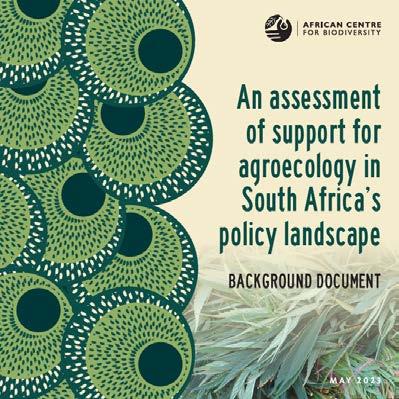
Discussions with the DALRRD to initiate an agroecology strategy/programme gained momentum in 2023, following on from the open letter,45 supported by 85 organisations, to Minister Thoko Didiza to push the Department to engage systematically and meaningfully with CSOs, including household and smallholder farmer networks across the country, and to expand and support agroecological initiatives. Preceding this, there were meetings among a loose network called Agroecology South Africa and, as early as 2015, the ACB wrote a report scanning what existed in SA regarding policy and practice in agroecology.46
National policy dialogue on just transition and adaptation in the food system
The dialogue47 was hosted in Johannesburg in September, in partnership with the Alliance for Rural Advancement (AFRA), Biowatch, Institute for Economic Justice (IEJ), Land Network National Engagement Strategy (LandNNES), TA, Climate Champions for Adaptation, the Adaptation Network, EMG and the National Labour and Economic Development Institute (NALEDI).
Organisations representing the labour movement, smallholder farmers, farm workers, labour tenants, informal traders, waste reclaimers, food, and land justice organisations, civil society and policymakers came together to discuss building a coordinated understanding and policy approach to a just transition in the South African food system across sectors. A predialogue synthesis report48 and a series of six fact sheets highlighting some of the key issues were produced, in English, Afrikaans, isiZulu, isiXhosa and Sepedi.49 The summary of presentations is available online50 and a mapping of future thematic priorities is detailed in the report that came out after the dialogue, in November.51
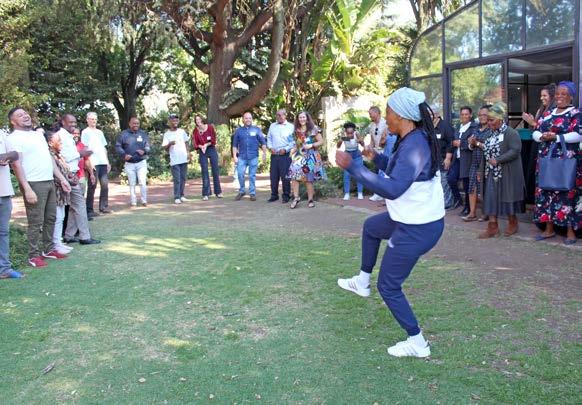
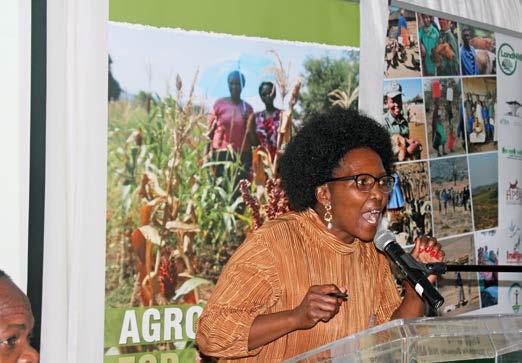
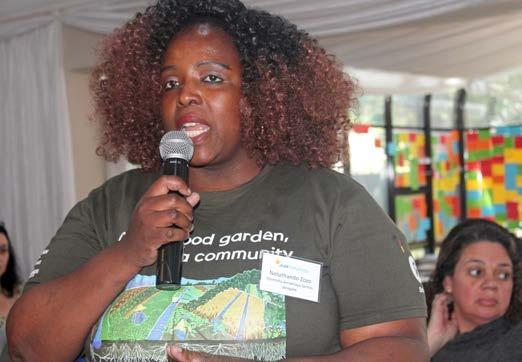
Alternatives thus go beyond simply responding to climate change, to also look at the multi-dimensional crisis of capitalism, the impacts on the food system, and pathways out of this death spiral. A just transition is about the distribution of risks and benefits in the transition, and who decides about what is acceptable in trade-offs and distribution of risk.
An initial core of the Civil society just transition framework for the food system52 was proposed at the dialogue and then updated to reflect the modifications and inputs made by participants, serving as a basis for more coordinated activity and policy input.
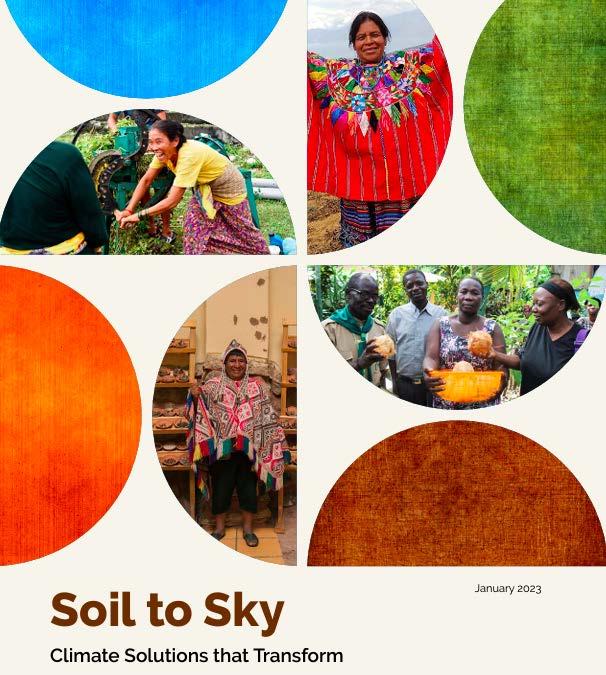
Highlighting the link between agricultural biodiversity, agroecology, climate change, and biodiversity
Mayet was an advisor in the process of overseeing the compilation of the report, Soil to Sky: Climate Solutions That Transform,53 and she presented on successful agroecology systems in Africa, with a focus on Benin, during the launch webinar.
Digital agriculture and financialisation in Africa’s agriculture
In part one, consisting of a briefing paper54 and linked fact sheet,55 we explore the status of digital agriculture in Africa and the potential implications its deployment has for smallholder farmers. The three primary areas of concern are related to potential inequitable benefits and influence accrued from its deployment; ownership of data and how it is used; and the potential exclusion and further marginalisation of peopleenvironment relationships and related knowledge systems.
Part two56 looks at how privatesector interests and motives drive the financialisation of Africa’s food and farming systems, leading to a dematerialisation of the reality of the work undertaken by Africa’s smallholder farmers to produce food for the continent, generate livelihoods and act as custodians of the land that sustains them. As a result, corporate dominance has grown in all elements of the food chain, funding into the real economy is reduced, and there is an increased focus on delivering short-term returns.
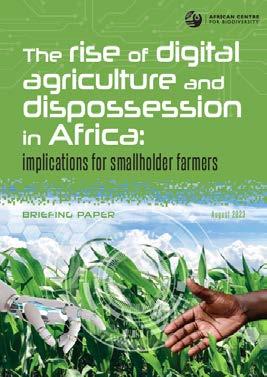

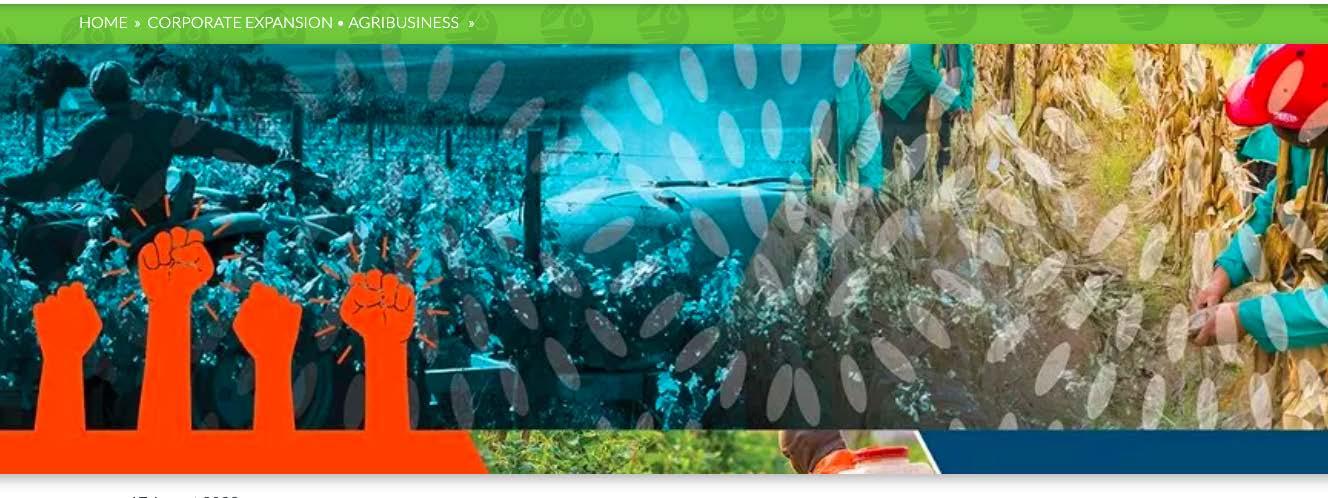
South African People’s Tribunal on Agrotoxins welcomes UN expert’s assessment highlighting human and environmental rights violations
Push back against pesticides in SA
Since 2022, there have been several joint meetings involving Unpoison, a multi-sectoral advocacy network of experts, institutions and organisations working on legal reform of the agrochemical sector. This included a large national consultation that the ACB convened in Johannesburg in April 2022.
Based on the outcomes, in June 2023 the ACB hosted a blueprint meeting towards a People’s Tribunal on Pesticides that brought together farm-worker representatives and
unions, support NGOs, campaign alliances, academics, and donor representatives. There was overall agreement that the issue of agrotoxins in SA is deeply problematic, resulting in gross human and environmental violations that need to be exposed, and a campaign built on solidarity is necessary to bring about structural changes in the way we produce food, in labour relations and in agrotoxin governance. Delegates were tasked with reporting back to their constituencies to gain mandates to set up the Tribunal in 2024.
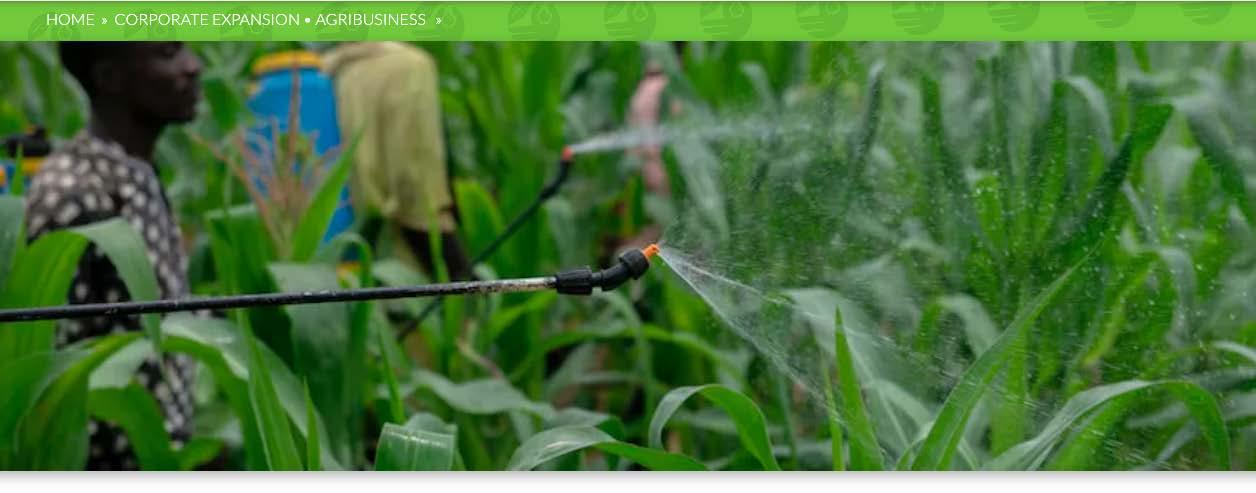
Then, in August, Unpoison made public a list57 that was previously kept secret and closely guarded by the pesticide industry showing there are 192 highly hazardous pesticides (HHPs) registered and in use in SA. Of these, only 16 have partial bans or restrictions, and over a third are banned in the EU because of unacceptable human health and environmental risks, while 36 belong to the most hazardous class, (WHO Group 1a and 1b), which are substances known to have carcinogenic potential for humans. UnPoison is calling on the DALRRD to urgently embark upon a process to phase out the use of toxic chemicals starting with HHPs.58
Later in the same month, as a collective we put out a press release59 welcoming the UN Special Rapporteur on human rights and toxins Dr Marcos Orellana’s assessment highlighting human and environmental rights violations. He announced his findings60 at a press briefing that concluded an exploratory visit to SA. He noted that the country prioritises chemically intensive agriculture, with the agchem industry having an impermissible influence in government affairs, and thus he recommended an overhaul of the related legislative framework, which is a strand of work that Unpoison focuses on.
The ACB has also been supporting campaigns in SA and the European Union that call for an end to the double standards of toxins banned in their country of origin being exported for use in Africa and elsewhere.
In September, 373 civil society and Indigenous Peoples organisations petitioned61 governments and other stakeholders of the Strategic Approach on International Chemicals Management, at the opening of the Fifth International Conference on Chemicals Management, to include targets to phase out HHPs in agriculture by 2030.
Other international policy forums and frameworks, including multilateral agreements on climate change and biodiversity loss, have made significant targeted political commitments on major crises that pose existential threats to humanity and the planet. However, HHPs have remained largely unaddressed.

Ultra-processed food (UPF) in Africa
We launched fact sheet one and two of a series.62 In the first part,63 Introduction to UPF,64 we attempt to succinctly describe and define UPF and how it differs from other foods, and outline the major concerns with UPF.
In part two,65 UPF consumption inAfrica,66 we explore the relationship between food environments and food choice, and systemic injustices and linkages between production, consumption, and trade agreements.
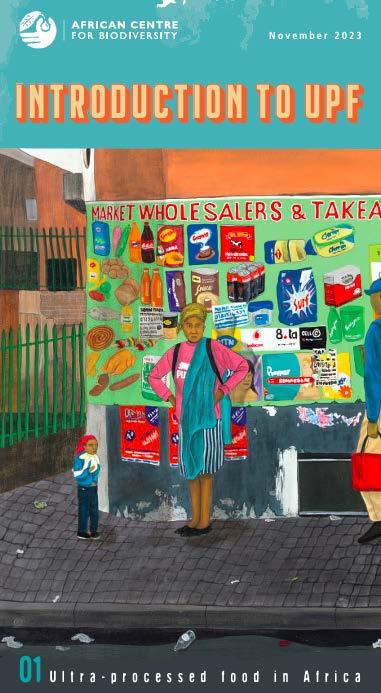
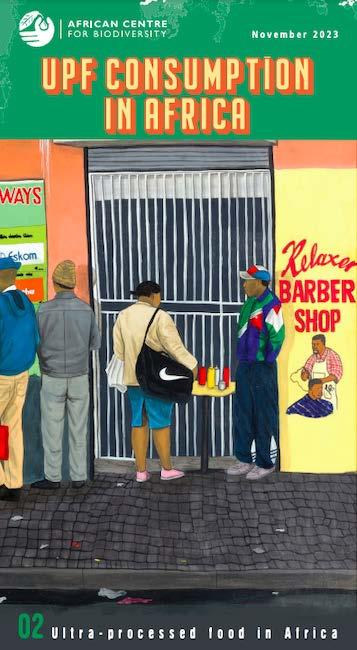
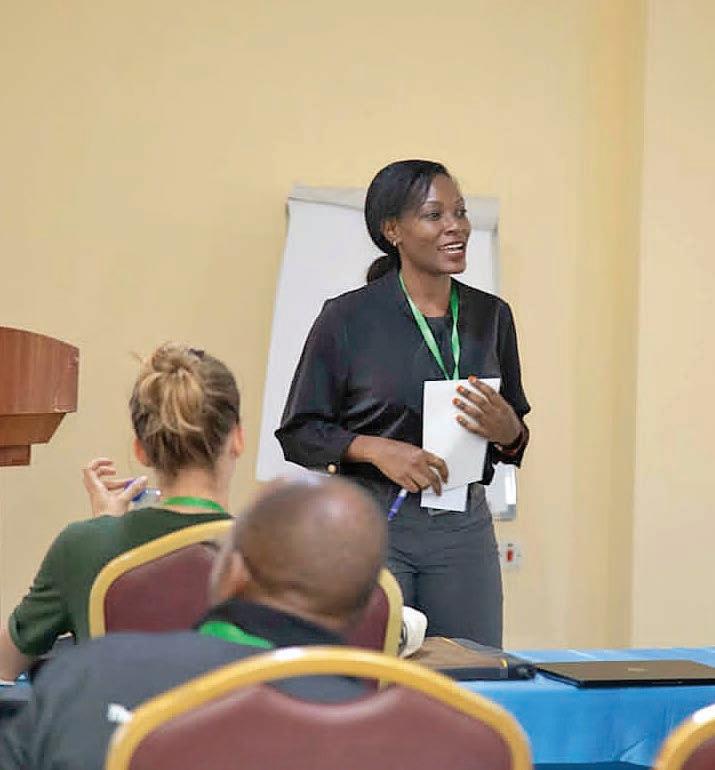
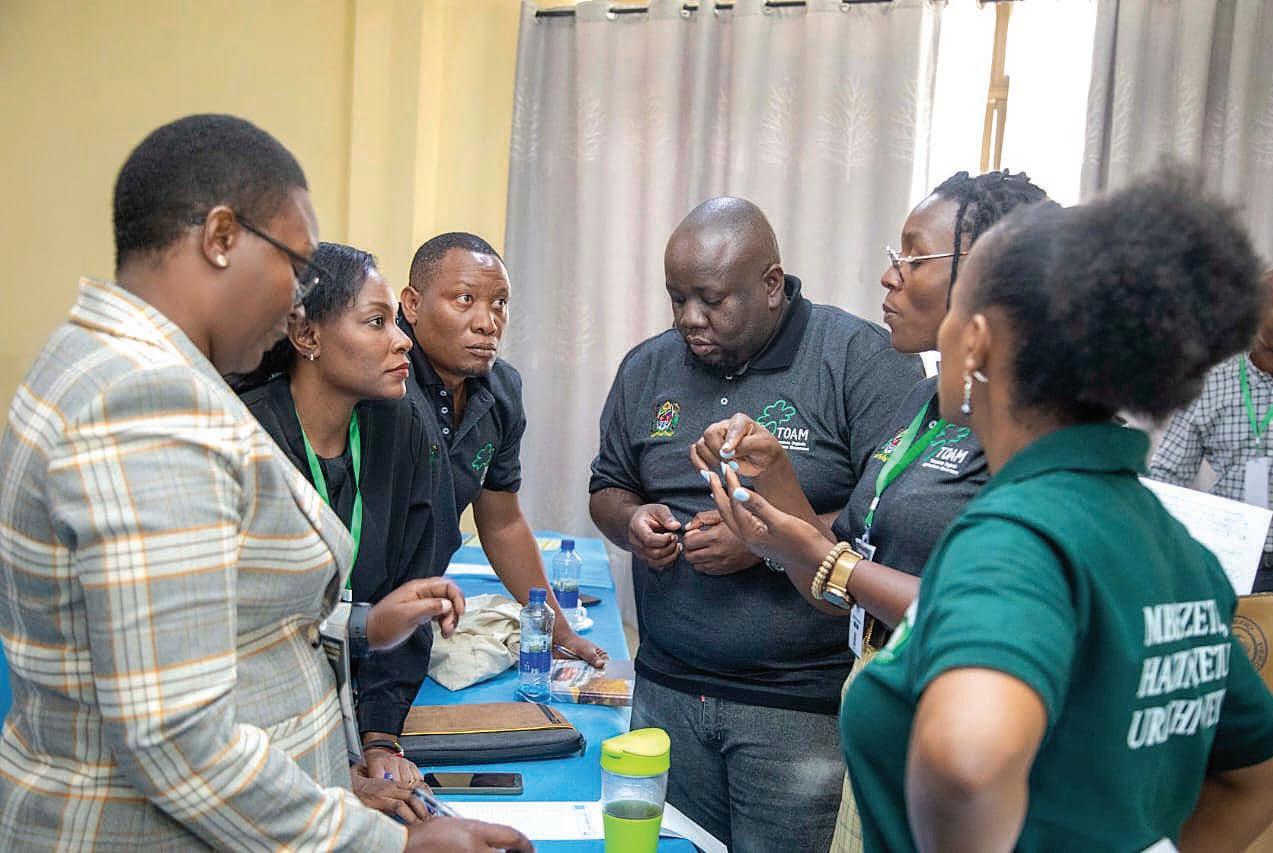
Masinjila participated in a panel discussion on agrobiodiversity and improved nutrition at this meeting in Tanzania. It also served as the launch of the National Ecological Organic Agriculture Strategy, led by the Deputy Minister of Agriculture. The ACB will continue to engage in the process going forward, with the expectation that a series of policy briefs will entail revisions to the strategy.
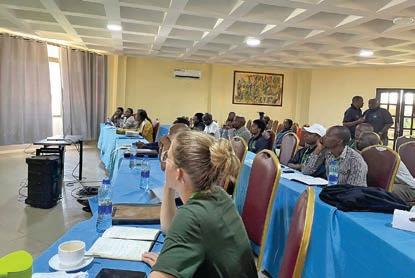
On World Food Day,67 marked annually on 16 October, we reflected on the discussions on building a coordinated understanding and policy approach to a just transition in the local food system in SA, sharing three videos of smallholder farmers in our network expressing their views on agroecology and sustainable farming practices: Lindani Zuma of Sweet Hill Organics, Kwazulu-Natal,68 Maxabandile Mlauli of the Sinako Sisònke Permaculture Cooperative, Eastern Cape69 and Reinette Heunis of Suurbraak Aquaponics, Western Cape.70
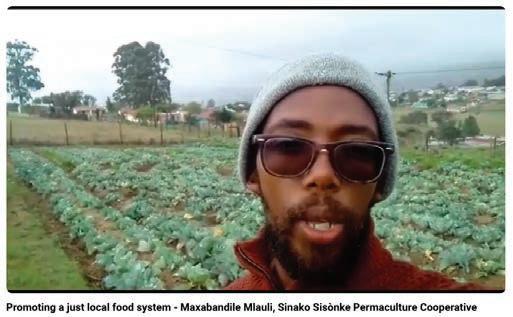
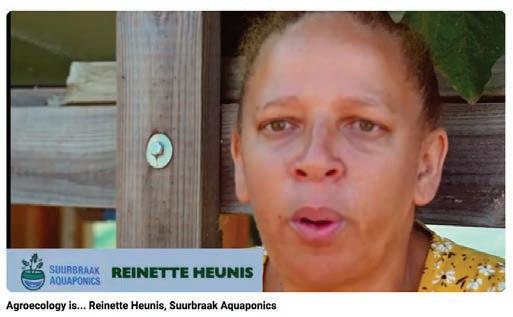
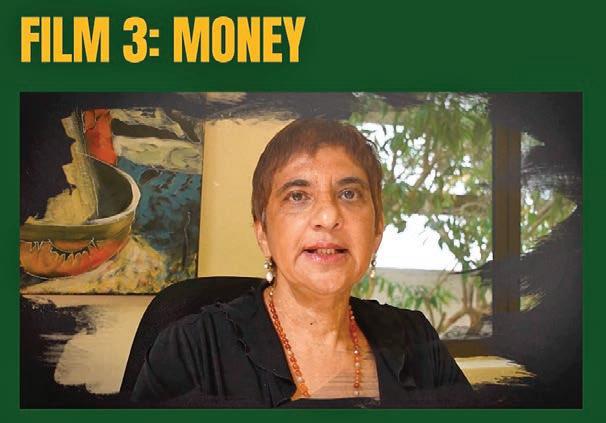
RichAppetites film series featuresACB Co-produced by AGRA Watch and AFSA, Rich Appetites71 is a five-part series that exposes the corporate capture of African agriculture and food systems, showing how billionaire philanthropists have pushed industrial agriculture around the globe – including in Africa. Mayet is featured in the third film, titled, Money,72 where she discusses the new wave of neo-colonialism plaguing the African food system, whereby philanthro-capitalists are
invading and taking control over policy-making spaces and shaping the creation of draconian seed laws to turn Africa into an integrated market to support the trade of agribusiness corporations.
Mayet was also part of the virtual screening and panel discussion, RichAppetites:The Corporate Capture ofAfrican Food Systems and the Hunger for Justice, hosted by AGRA Watch.73
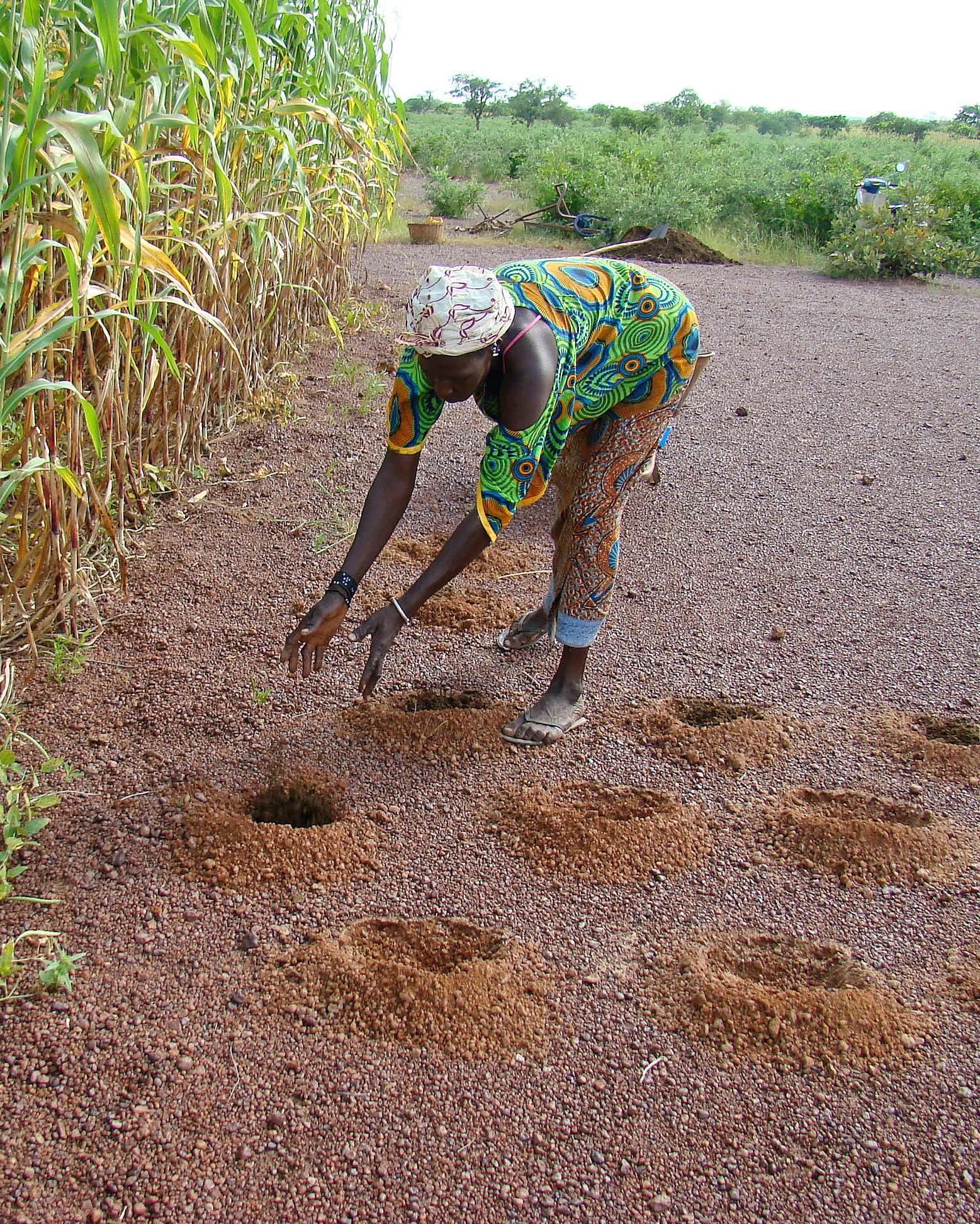
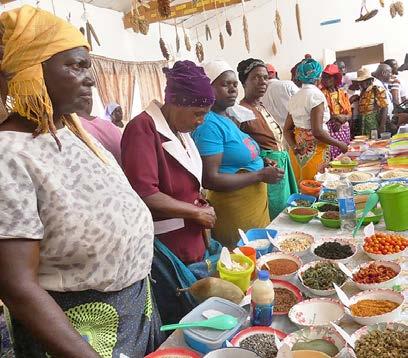
The ACB continues to stand out on the continent, having an explicitly political project of transformation of the corporatecontrolled food and seed regime towards popular democratic, collective action, resource use and decision-making. We consistently work within our theory of change: producing in-depth research and analysis; building alliances; strengthening public action and advocacy; and contributing to discourse and policy shifts to limit corporate power, while building enabling environments to strengthen farmer seed and food systems, and agricultural biodiversity. This work is iterative and complex with many moving parts. The ACB has shifted discourses and practices in society that have in turn contributed to a broadbased movement working towards the protection of agricultural biodiversity and FSS, agroecology, food sovereignty, collective action and democracy.
Our leadership in strenuously resisting the encroachment of corporate laws and policies into African food and seed systems, and our work towards transforming biosafety, seed and related agriculture policies and laws to protect, support and strengthen FSS and realise transitions to agroecological farming in Africa, has been taken up by a wide range of actors. The ACB’s body of work and website stands as institutional memory on issues of biosafety, corporate expansion, and seed laws and policies, in the context of FR and FMSS.
The ACB’s website analytics show that more than 42% of visitors are between the ages of 18 and 34 years old; thus, an interested audience in this age range is already participating and contributing to ACB’s theory of change.
Overall, we have learned that networking and alliance building are critical components of influencing change and knowledge creation for local partners and stakeholders. As a result, the ACB’s sphere of influence has expanded regionally and continentally throughout Africa. This work also entails the ACB facilitating partnerships and connections at the local, regional and global levels.
In 2023, our social media and website performance demonstrated significant, consistent growth and engagement, as our online presence continued to resonate within our African networks and beyond. We grew our reach and followers across channels, reflecting the strength of our online community and the relevance of our work.
ACB website
11,000+ website users ( 158%)*
47,000+ website views ( 322%)
ACB subscribers
Total: 7,243
Social media
Visits: 2,973 visits ( 150%)
Followers: 16,700
Reach*: 36,000K ( 103%)
(*Reach is the number of people who saw any content from or about ACB’s Page)
Followers: 2,841
Impressions: 31,271
Views: 3,800
Channel views: 38,500 since June 2017
Followers: 336
Total reach: ±21,000K
*All increases refer to year-on-year growth
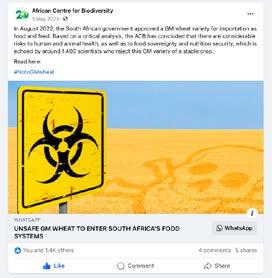

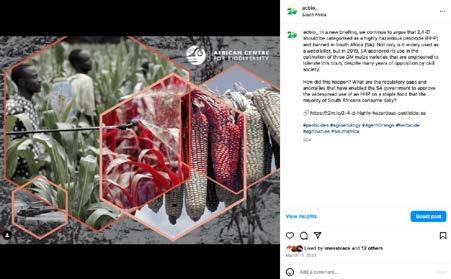
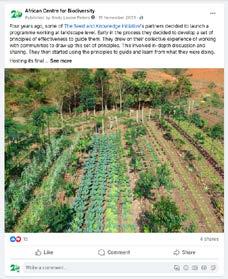
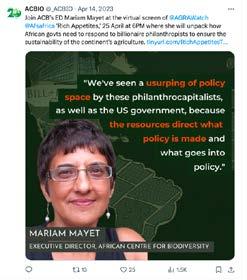
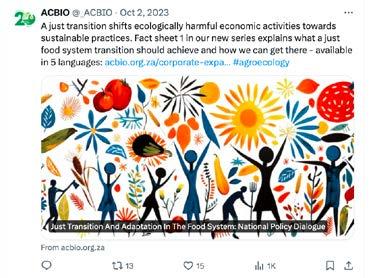
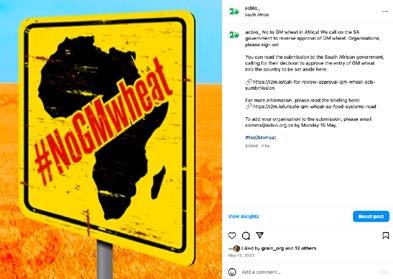
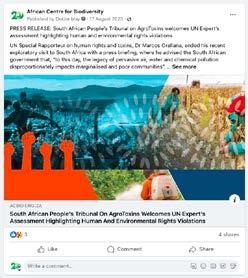
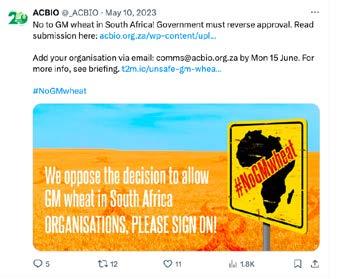
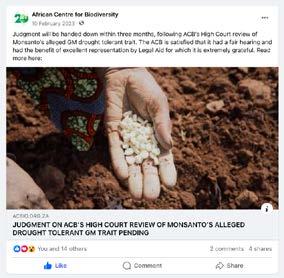


We strengthened ties with organisations working collectively to foster just transitions in SA founded on agroecological principles.
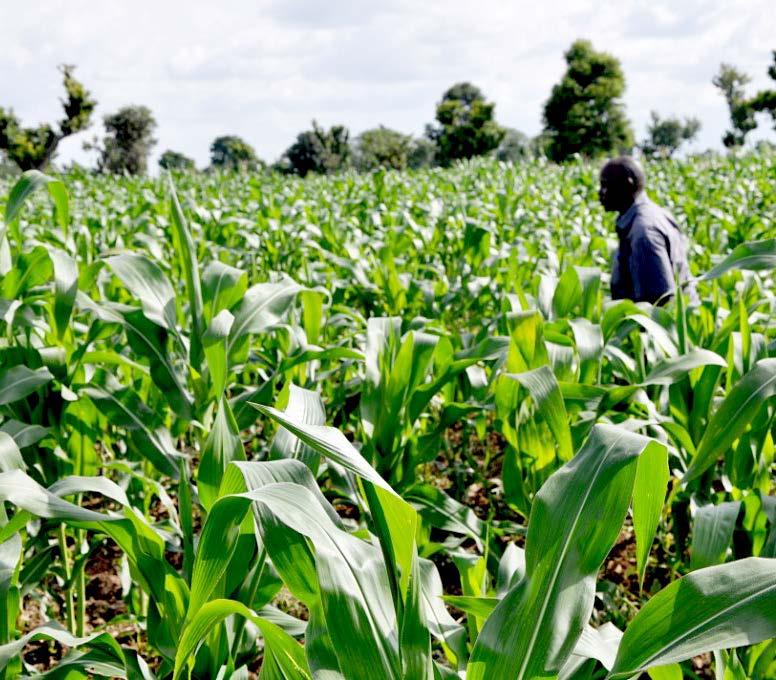
We continued to strengthen new relationships that assist in advancing our advocacy work with a wide range of historical and new partners. Stakeholders include farmers; CSOs, especially smallholder farmer associations; non-governmental organisations (NGOs); social movements working in the fields of smallholder agriculture, agroecology, seed and biodiversity; governments; experts and researchers from public sector institutions; and donors. In particular, we strengthened ties with organisations working collectively to foster just transitions in SA that include a shift in agriculture founded on agroecological principles.
Increasingly, we have also forged stronger relationships with CSOs engaged in climate change discourses, including with the AGN, under the CBD’s negotiations towards the GBF discussions, the ACBA, and our increased partner base through the campaigning and events the ACB continued to support.
We have a large number of partners in the SADC region, the rest of the continent, and internationally. Strong linkages to constituencies on the ground provides the basis for collective work on multiple regional processes, and also informs our advocacy in international policy spaces.
South Africa
Adaptation Network
Agrarian Reform for Food
Sovereignty Campaign (FSC)
Alliance for Rural Advancement (AFRA)
Association for Water and Rural Development (AWARD)
Biowatch South Africa
Climate Champions for Adaptation
Commercial, Stevedoring, Agricultural and Allied Workers Union (CSAAWU)
Co-operative and Policy
Alternative Centre (COPAC)
Dzomo la Mupo
Earthlore Foundation
Eastern Cape Agroecology Farmers Association (ECAFA)
Environmental Monitoring Group
Friends of the Earth
Greenhouse Project (The)
Gumbu Community Seed Bank
GroundWork
Institute for Economic Justice (IEJ)
Ilizwi Lamafama
Izindaba Zokudla
Land Access Movement of South Africa (LAMOSA)
Land Network National Engagement Strategy (LandNNES)
Masifundise
National Labour and Economic Development Institute (NALEDI)
Participatory Guarantee Systems (PGS)
Port St John’s Farmers Association
Rainbow Maize Farmers
Seed And Knowledge Initiative (SKI)
South African National Biodiversity Institute (SANBI)
South African Organic Sector
Organisation (SAOSA)
Southern African Catholic Bishops
Association (SACBC) Justice and Peace
Southern African Faith Communities
Environment Institute (SAFCEI)
South African Food Sovereignty Campaign (SAFSC)
South Durban Community
Environmental Alliance (SDCEA)
Surplus People Project (SPP)
Trust for Community Outreach and Education (TCOE)
Tshintsha Amakhaya
Ukuvuna
UnPoison SA
Women on Farms Project
Africa
Burkina Faso
Fédération Nationale des Groupements de Naam (FNGN)
Fédération Nationale des Organisations
Paysannes (FENOP)
Terre A Vie
Cameroon
Plateforme Sous Régionale des Organisations
Paysannes d’Afrique Centrale (PROPAC)
Côte d’Ivoire
Copagen
Democratic Republic of Congo
Common Front for the Protection of the Environment and Protected Spaces of the DRC (FCPEEP)
Ghana
Centre for Indigenous Knowledge and Organizational Development (CIKOD)
Food Sovereignty Ghana (FSG)
Guinea ACORD
Kenya
African Wildlife Foundation (AWF)
Biodiversity and Biosafety
Association Kenya (BIBA-K)
Kenyan Peasants League (KPL)
Kenya Small Scale Farmers Forum
Mazingira Institute
World Forum of Fisher Peoples/ The Elmolo Forum
Mali
Biodiversité Echange et diffusion d’expériences (BEDE-asso)
Coalition des Femmes pour la souveraineté alimentaire (COFERSA)
Comité Ouest Africaine des semences paysanne (COASP)
Malawi
Commons for Ecojustice (CEJ)
Mozambique
Acção Acadêmica para o Desenvolvimento das Comunidades Rurais (ADECRU)
Associação Rural de Ajuda Mútua (ORAM)
Justiça Ambiental (JA)
Kaleidoscopio
Livaningo
Uniao Nacional de Camponeses (UNAC)
Nigeria
Environmental Rights Action (ERA) Health of Mother Earth Foundation (HOMEF)
Rwanda
Participatory Ecological Land Use Management (Pelum)
Senegal
Environnement Développement
Action pour la Protection Naturelle des Terroirs (ENDA PRONAT)
Tanzania
National Network of Small-Scale Farmers
Groups in Tanzania – Mtandao wa Vikundi vya Wakulima (MVIWATA)
Mtandao wa Vikundi vya Wakulima Mkoa wa Kilimanjaro (MVIWAKI)
Sustainable Agriculture (SAT)
Tanzanian Alliance for Biodiversity (TABIO)
Tanzania Organic Agriculture Movement (TOAM)
Zanzibar Fruit and Vegetable Growers Association (UWAMWIMA)
Togo
Action Réelle sur l’Environnement l’Enfance et la Jeunesse (AREJ)
Uganda Advocates Coalition for Development and Environment (ACODE)
Caritas
Eastern and Southern Africa Small Scale Farmers Forum (ESAFF)
Southern and Eastern Africa Trade Information (SEATINI)
Zambia
Kasisi Agricultural Training Centre
Zambian Alliance for Agroecology and Biodiversity (ZAAB)
Zimbabwe
Community Technology Development Trust (CTDT)
Participatory Ecological Land Use
Management Zimbabwe (PELUM)
Participatory Organic Research & Extension Training (PORET) Towards Sustainable Use of Resources Organisation (TSURO Trust)
Zimbabwe Seed Sovereignty Programme (ZSSP)
Zimbabwe Smallholder Organic Farmers’ Forum (Zimsoff)
Beyond the continent
Belgium
International Panel of Experts on Sustainable Food Systems (IPES-Food)
Brazil
Centro de Tecnologias Alternativas da Zona da Mata CTA-ZM Movimento Ciência Cidadã
Canada
Erosion, Technology and Concentration (ETC) Group
Ecuador Acción Ecológica
Germany
Testbiotech
Indonesia FIAN Indonesia
Italy
Schola Campesina APS
Malaysia
Sahabat Alam Malaysia (SAM)
Netherlands
Both ENDS
Paraguay
BASE Investigaciones Sociales
Pan Sin Veneno
Peru
Asociación ANDES
Spain
GRAIN
Switzerland Association for Plant Breeding for the Benefit of Society (APBREBES)
United Kingdom
AgroecologyNow! – Centre for Agroecology, Water and Resilience
Gaia Foundation
United States
AgroEcology Fund
Community Alliance for Global Justice (CAGJ)
US Right to Know
Regional
African CSOs Biodiversity Alliance (ACBA) Alliance for Food Sovereignty in Africa (AFSA) (Pan-Africa)
Red Por una América Latina Libre de Transgénicos (RALLT)
Rural Women’s Assembly (RWA)
– Southern African
Southeast Asia Regional Initiatives for Community Empowerment (SEARICE)
Southern and Eastern Africa Trade Information and Negotiations Institute (SEATINI)
Unión de Científicos Comprometidos con la Sociedad y la Naturaleza de América Latina (UCCSNAL)
International
Food First Information and Action (FIAN)
Friends of the Earth (FoE)
Groundswell International
International Planning Committee for Food Sovereignty (IPC)
Network of Farmers’ and Agricultural Producers’ Organisations of West Africa (ROPPA)
Nia Terro
La Via Campesina Africa (LVC)
Pesticide Action Network (PANInt)
Third World Network (TWN)
World Rainforest Movement (WRM) CBD Alliance
Navdanya International
As of December 2023, the ACB had a staff complement of 8 (7 fulltime, 62.5% women, 75% black), consisting of:
• Four research and advocacy (three women, three black)
• Two communications (two women, one black)
• Two administration and finance (two black)
• Total operational staff: eight (five women, six black )
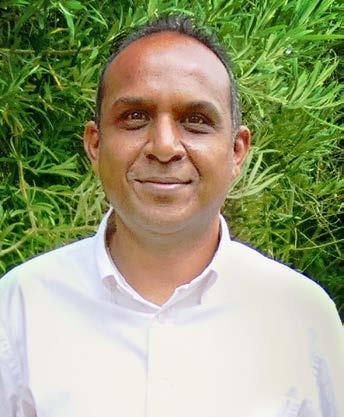
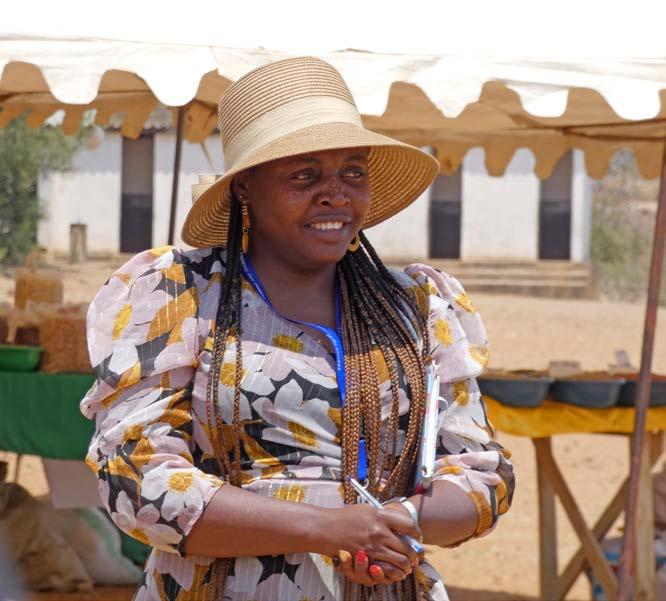
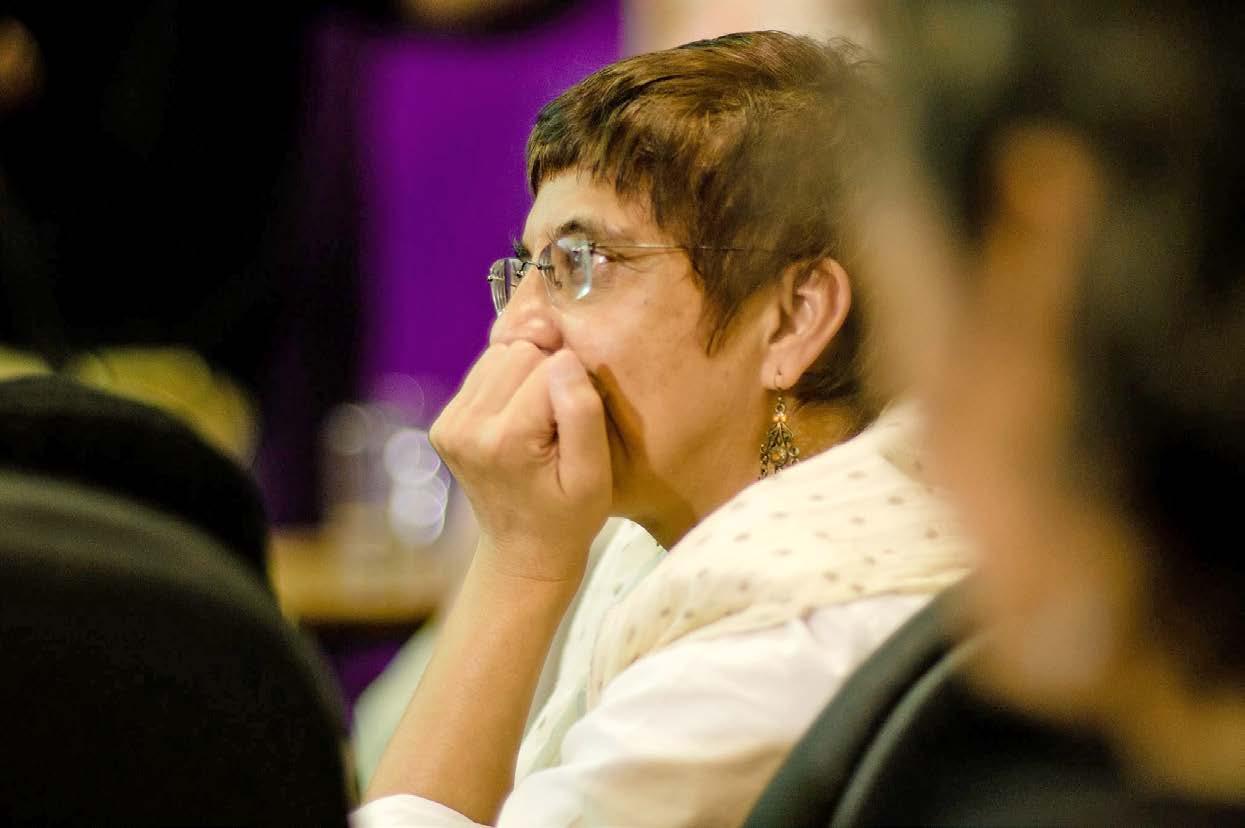
Mariam Mayet, Executive Director
Dr Stephen Greenberg, Senior Research and Advocacy Officer
Sabrina Masiinjila, Research and Advocacy Officer (based in Tanzania)
Rutendo Zendah, Research and Advocacy Officer
Deidre May, Communications Coordinator
Sindy Peters, Communications Officer
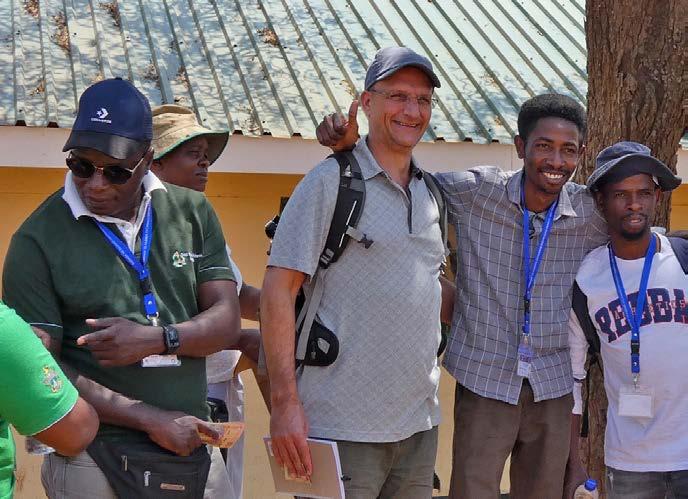
Vinern Naidoo, Administration Officer
Naeemullah Mohammed, Accounting Officer
Staff changes
Research and Advocacy Officer Dr Stephen Greenberg rejoined ACB on a part-time basis in November 2022. Research and Advocacy Officer Linzi Lewis left at the end of January 2023. Fatima Karodia’s contract as HR Officer ended in February and Communications Officer Tamara Reddy left at the end of May. This position was filled by Sindy Peters who joined the ACB in August. M&E Officer Rifqah Tifloen left the organisation at the end of October.
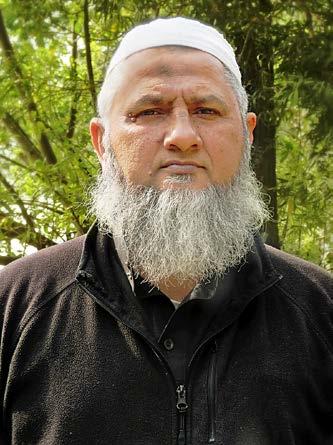
Our work is anchored in a value system of reciprocal, horizontal and interconnected relationships between people and nature.
John Wilson, chairperson, based in Zimbabwe
Famara Diédhiou, based in Senegal
Mariann Bassey Orovwuje, based in Nigeria
Ray Patridge, based in South Africa
Barbara Ntambirweki, based in Uganda
Mariam Mayet, non-executive board member, based in South Africa
The ACB was happy to welcome a new member to our board – Barbara Ntambirweki – a lawyer and researcher from Uganda, who also works with ETC Group, following on from many years of networking and collaborating.
Governance and administration of resources
We continue to strive for overall efficiency and adaptability in terms of the management of our time, staff and other resources. Our financial statements are available on request.
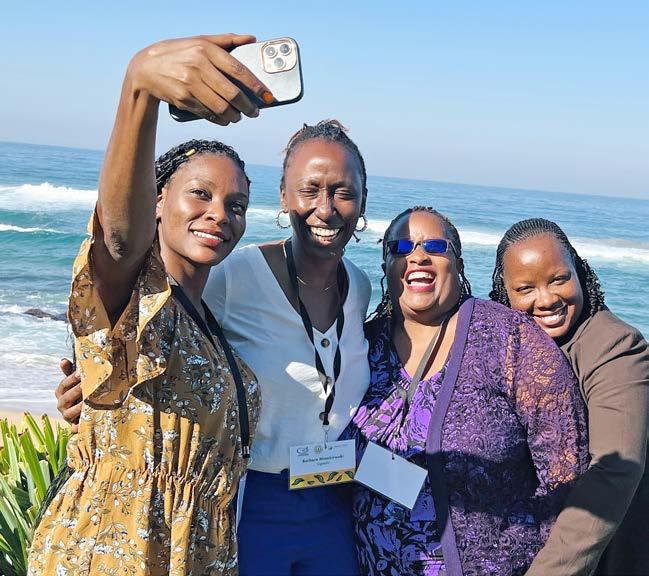
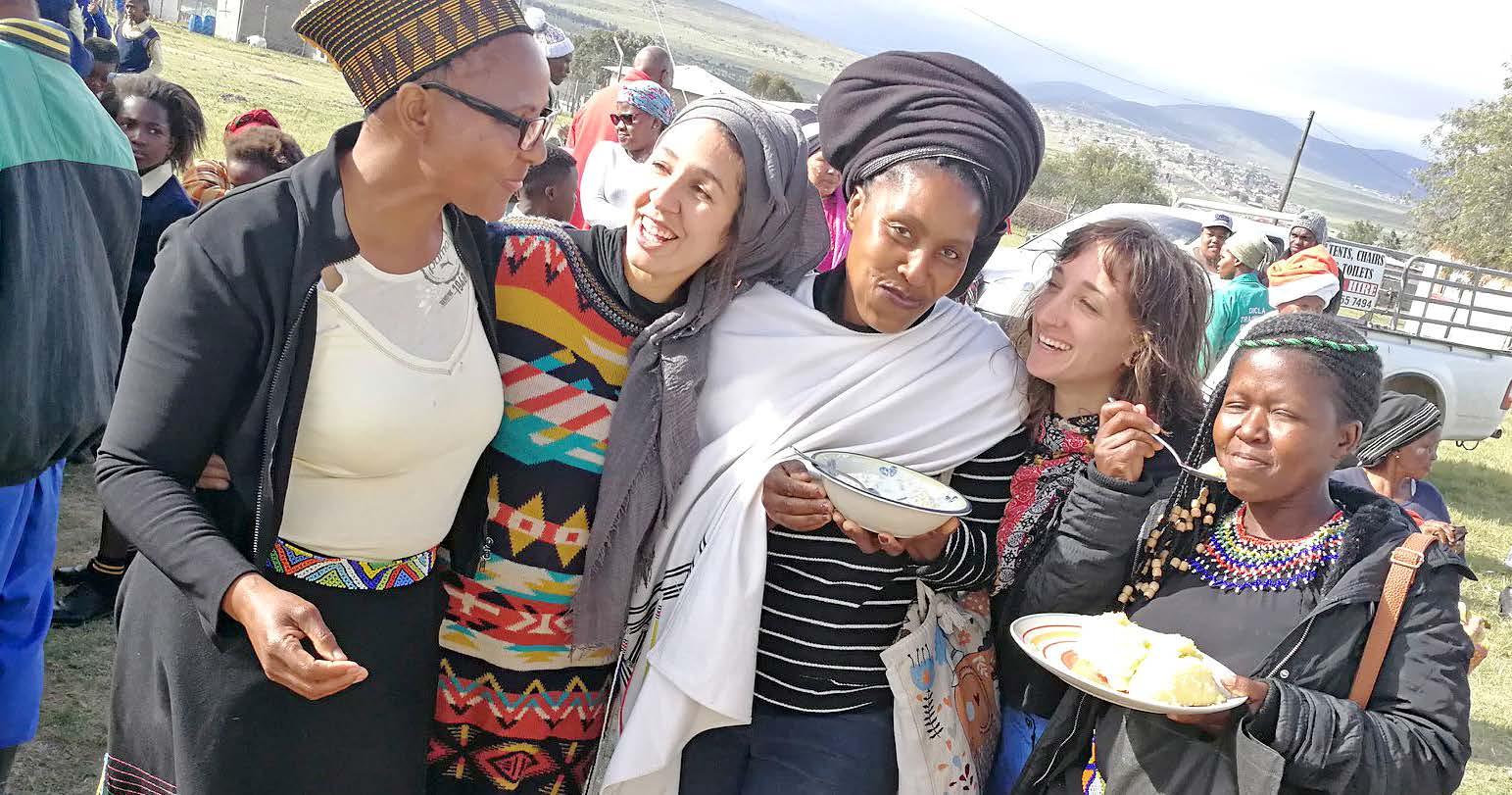
ACB African Centre for Biodiversity
ACBA African CSOs Biodiversity Alliance
AGP Africa Group Regional Preparatory meeting to GB of ITPGRFA
AGRA Alliance for a Green Revolution in Africa
APBREBES Association for Plant Breeding for the Benefit of Society
AI Artificial intelligence
ARC SA Agricultural Research Council
AU African Union
AUC African Union Commission
AFSA Alliance for Food Sovereignty in Africa
AGN African Group of Negotiators
AHTEG Ad Hoc Technical Experts Group
BOLD Biodiversity for Opportunities, Livelihoods and Development
CBD United Nations Convention on Biological Diversity
COP15 CBD’s Fifteenth Conference of Parties (COP 15)
CSO Civil society organisation
CTDO Community Technology Development Organisation
DALRRD SA Department of Agriculture, Land Reform and Rural Development
DEFF Department of Environment, Forestry and Fisheries
DSI Digital sequence information
FAO Food and Agriculture Organisation of the United Nations
FIAN Food First Information and Action Network
FR Farmers’ Rights
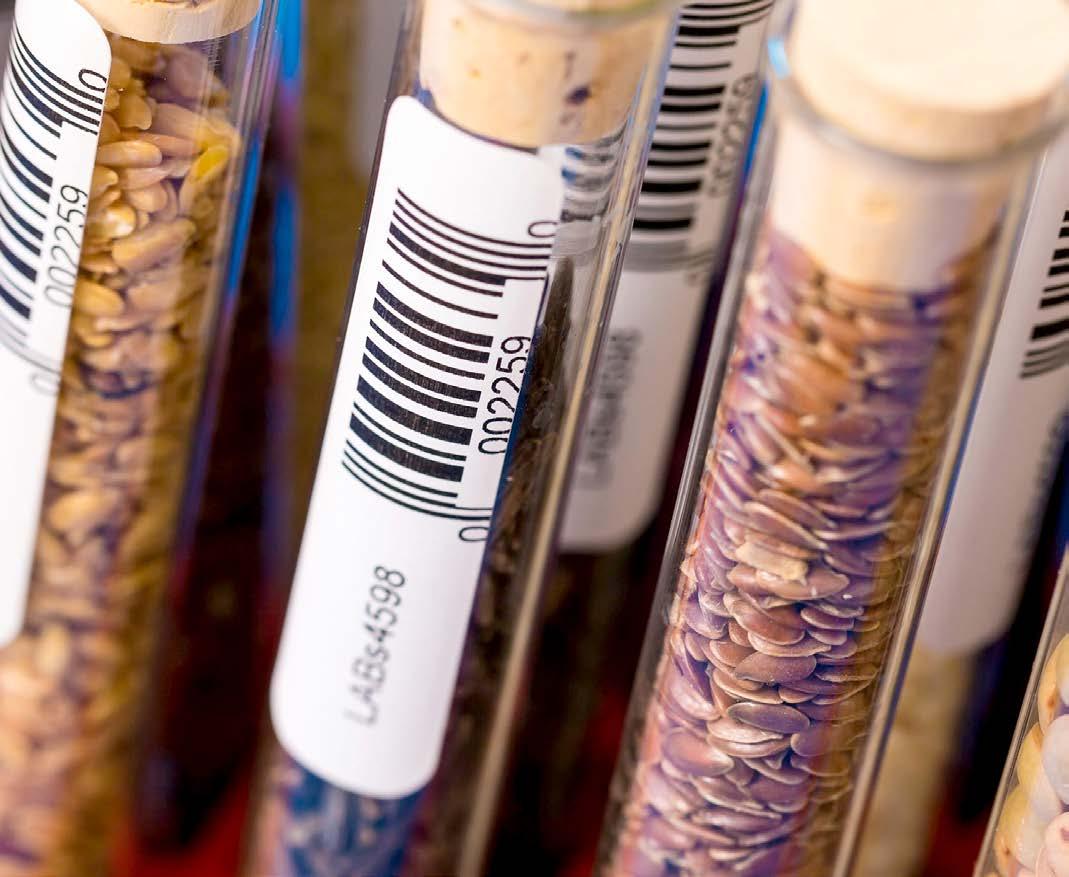

GB Governing Body of the ITPGRFA
GBF Post-2020 Global Biodiversity Framework
GM Genetically modified
GMO Genetically modified organism
HHP High hazardous pesticide
HLPE Committee on World Food Security’s High-Level Panel of Experts on Food and Nutrition
IP Intellectual property
ITPGRFA International Treaty on Plant Genetic Resources for Food and Agriculture
LVC La Via Campesina
MNCs Multi-national companies
NbS Nature based solutions
NBSAPs National Biodiversity Strategies and Action Plans
NGO Non-government organisation
PGRFA Plant genetic resources for food and agriculture
PVP Plant variety protection
SA South Africa
SADC Southern African Development Community
SBI Subsidiary Body on Implementation
SBSTTA Subsidiary Body of Scientific and Technological Advice
SDC Swiss Agency for Development Cooperation
SSN Seed Savers Network
TWN Third World Network
UPOV International Union for the Protection of New Varieties of Plants
1. https://acbio.org.za/our-approach/
2. https://acbio.org.za/gm-biosafety/africa/gbf-biosafety-cop15/
3. https://acbio.org.za/corporate-expansion/the-africa-we-want/
4. https://acbio.org.za/wp-content/uploads/2023/07/AFRICANCENTRE-FOR-BIODIVERSITY-V-MINISTER-OF-AGRICULTUREAND-OTHERS-275.pdf
5. https://acbio.org.za/gm-biosafety/high-court-decision-gmdrought-tolerant-maize-blow-to-environmental-law-decisionmaking/
6. https://acbio.org.za/gm-biosafety/activism-bogus-droughttolerant-maize-south-africa-high-court-review/
7. https://t2m.io/unsafe-gm-wheat-sa; press release: https://acbio. org.za/gm-biosafety/south-africa/gm-wheat-out-of-africa/
8. https://t2m.io/call-for-review-approval-gm-wheat-acbsumbmission
9. https://acbio.org.za/wp-content/uploads/2023/03/2-4-d-gmmaize-regulatory-anomalies-regarding-gmos-associatedpesticides.pdf; web post: https://acbio.org.za/gm-biosafety/24dhighly-hazardous-pesticide-south-africa
10. https://acbio.org.za/wp-content/uploads/2023/12/Call-reviewderegistration-24D_ACBsubmission_Dec2023-1.pdf
11. https://acbio.org.za/wp-content/uploads/2023/08/SeedHarmonisation-in-Eastern-and-Southern-Africa_August2023_ fin.pdf
12. https://acbio.org.za/tags-harmonised-seed-laws/?s=a&post_ type=post; https://acbio.org.za/research-and-resources/ category-seed-sovereignty/tags-harmonised-seed-laws/
13. See: https://acbio.org.za/seed-sovereignty/seed-laws-policies/ harmonisation-seed-laws-africa/ and https://acbio.org.za/ corporate-expansion/commentary-submitted-fao-discussionafcfta-food-agriculture/
14. https://acbio.org.za/seed-sovereignty/zanzibars-draconian-seedlaw-in-the-offing-case-study-of-unabated-corporate-expansionand-control-of-africas-seed-systems/
15. https://acbio.org.za/wp-content/uploads/2023/11/Mozambicanseed-legislation_comments_ACB_fin.pdf
16. https://acbio.org.za/seed-sovereignty/draft-plant-breedersrights-and-plant-improvement-act-regulations/
17. https://acbio.org.za/seed-sovereignty/farmer-seed-systems/ south-africas-new-plant-breeders-rights-act-effect-farmersrights-managed-seed-systems/
18. https://acbio.org.za/seed-sovereignty/regulations-plantimprovement-act-plant-breeders-rights-act-2018/
19. https://acbio.org.za/seed-sovereignty/seed-laws-policies/ lobbying-papers-south-africas-plant-improvement-bill-plantbreeders-rights-bill/
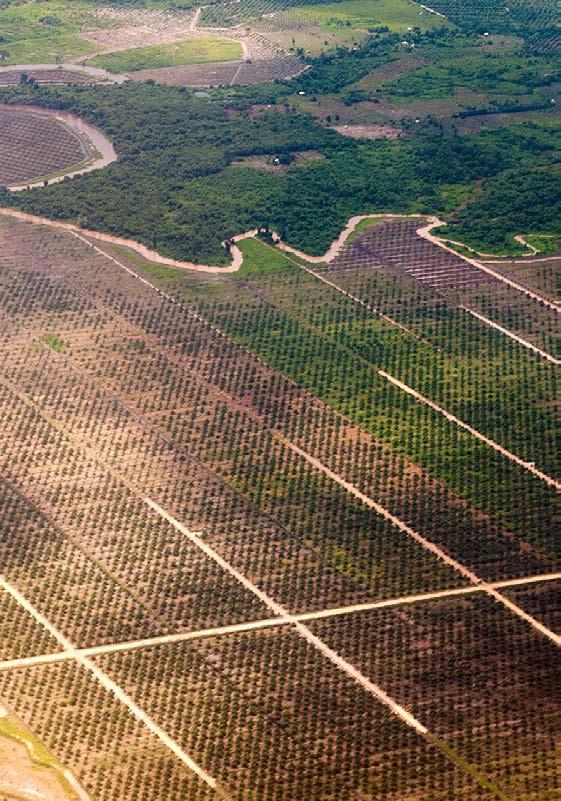
20. https://acbio.org.za/seed-sovereignty/seed-lawspolicies/call-public-meeting-corporate-seed-billsahead-public-hearing/
21. https://acbio.org.za/seed-sovereignty/seed-lawspolicies/resistance-fertile-farmers-rise-against-southafricas-corporate-seed-laws/
22. https://acbio.org.za/seed-sovereignty/seed-lawspolicies/call-action-make-submissions-opposecorporate-seed-bills-save-our-seeds/
23. https://acbio.org.za/seed-sovereignty/seed-lawspolicies/parliamentary-consultation-decision-makingsas-corporate-seed-bills-sham/
24. https://acbio.org.za/seed-sovereignty/south-africamoves-recognising-smallholder-farmers-rights
25. https://acbio.org.za/wp-content/uploads/2023/01/ Farmer-Exchange-Zim-report.pdf
26. https://acbio.org.za/zimbabwean-farmers-show-wayalternative-food-systems
27. https://www.flickr.com/photos/184809243@N06/ albums/72177720303955314/
28. https://acbio.org.za/seed-sovereignty/reflectionszimbabwe-west-africa-seed-fair
29. https://acbio.org.za/seed-sovereignty/upov-alignedpvp-laws-impinge-on-farmer-seed-systems/
30. https://www.facebook.com/groups/904253430508472
31. https://acbio.org.za/seed-sovereignty/seed-lawspolicies/citizens-world-oppose-intellectual-propertyover-seed-reclaim-restore-local-food-systemsbiodiversity/
32. https://acbio.org.za/seed-sovereignty/the-last-seedacb
33. https://youtu.be/sT3EmlGoOLA
34. https://www.cbd.int/gbf/
35. https://www.cbd.int/conferences/nairobi-2023
36. https://acbio.org.za/corporate-expansion/acb-attends25th-sbstta-meeting-in-kenya/
37. https://cbd-alliance.org/sites/default/files/2023-10/ ECO%20SBSTTA25%20DAY3.pdf
38. https://cbd-alliance.org/sites/default/files/2023-10/ ECO%20SBSTTA-25%20Day%201.pdf
39. https://t2m.io/cultivate_diversity_just_agroecology_ post
40. https://www.foodsovereignty.org/wp-content/ uploads/2023/04/NYELENI-BOOKLET-EN-1.pdf
41. https://pmg.org.za/committeemeeting/36544/?via=homepage-feature-card
42. https://t2m.io/agroeco_assess_report
43. https://t2m.io/agroeco_assess_brief
44. https://acbio.org.za/wp-content/uploads/2023/06/ Evaluation-agroecologie-dans-le-paysage-politiquesudafricain.pdf
45. https://acbio.org.za/wp-content/uploads/2022/12/ open-letter-minister-didiza-calling-agroecologystrategy-programme-endorsements-dec22.pdf
46. https://acbio.org.za/corporate-expansion/agroecologysouth-africa-policy-practice/
47. https://acbio.org.za/corporate-expansion/justtransition-and-adaptation-in-the-food-systemnational-policy-dialogue/
48. https://acbio.org.za/wp-content/uploads/2023/09/ Just-transitions-Synthesis-Report-pre-dialogue_web_ fin.pdf
49. https://acbio.org.za/corporate-expansion/justtransition-and-adaptation-in-the-food-systemnational-policy-dialogue/
50. https://acbio.org.za/wp-content/uploads/2023/11/ Summary-of-presentations-to-Just-TransitionNational-Dialogue.pdf
51. https://acbio.org.za/wp-content/uploads/2023/11/ Just-Transition-SA-Food-System-Thematic-synthesisand-priorities.pdf
52. https://acbio.org.za/wp-content/uploads/2023/11/ Civil-society-just-transition-framework-for-the-foodsystem.pdf
53. https://climasolutions.org/resource/soil-to-skyclimate-solutions-that-transform/
54. https://t2m.io/digitalisation_agriculture_briefing
55. https://t2m.io/Digitalisation_agriculture_Africa_ factsheet
56. https://t2m.io/Financialisation_digitalisation_ agriculture_Africa_briefing
57. https://unpoison.org/wp-content/uploads/2023/08/ SA-list-of-Highly-Hazardous-Pesticides-using-JMPMcriteria-WHOFAO-ban-comparisson.pdf
58. https://acbio.org.za/corporate-expansion/southafricas-highly-hazardous-pesticides-published-byunpoison/
59. https://acbio.org.za/corporate-expansion/southafrican-peoples-tribunal-on-agrotoxins-welcomesun-experts-assessment-highlighting-human-andenvironmental-rights-violations/
60. https://www.ohchr.org/sites/default/files/documents/ issues/toxicwastes/statements/eom-statement-southafrica-sr-toxic-2023-08-11.pdf
61. https://drive.google.com/file/d/1fyQ713DOaao6umEmVwY2GsSQVLdf6xi/view
62. https://acbio.org.za/corporate-expansion/ultraprocessed-food-in-africa/
63. https://t2m.io/UPFpart1
64. https://t2m.io/UPFpart1
65. https://t2m.io/UPFpart2
66. https://t2m.io/UPFpart2
67. https://acbio.org.za/corporate-expansion/agroecology/ world-food-day-2023-working-towards-a-just-foodsystem-for-all/
68. https://youtube.com/shorts/P2FjA3MK-88
69. https://www.youtube.com/watch?v=ns21j0-pfbw
70. https://youtu.be/6VJZWLAb2-c
71. https://www.richappetitesfilm.com/
72. https://acbio.org.za/corporate-expansion/richappetites/
73. https://youtu.be/ oh8p35coEeU?si=_7nS6QXLZTZeZ90u
74. https://afsafrica.org/afsa-statement-on-afdbs-dakar-2food-summit/
75. https://acbio.org.za/gm-biosafety/activism-bogusdrought-tolerant-maize-south-africa-high-courtreview/